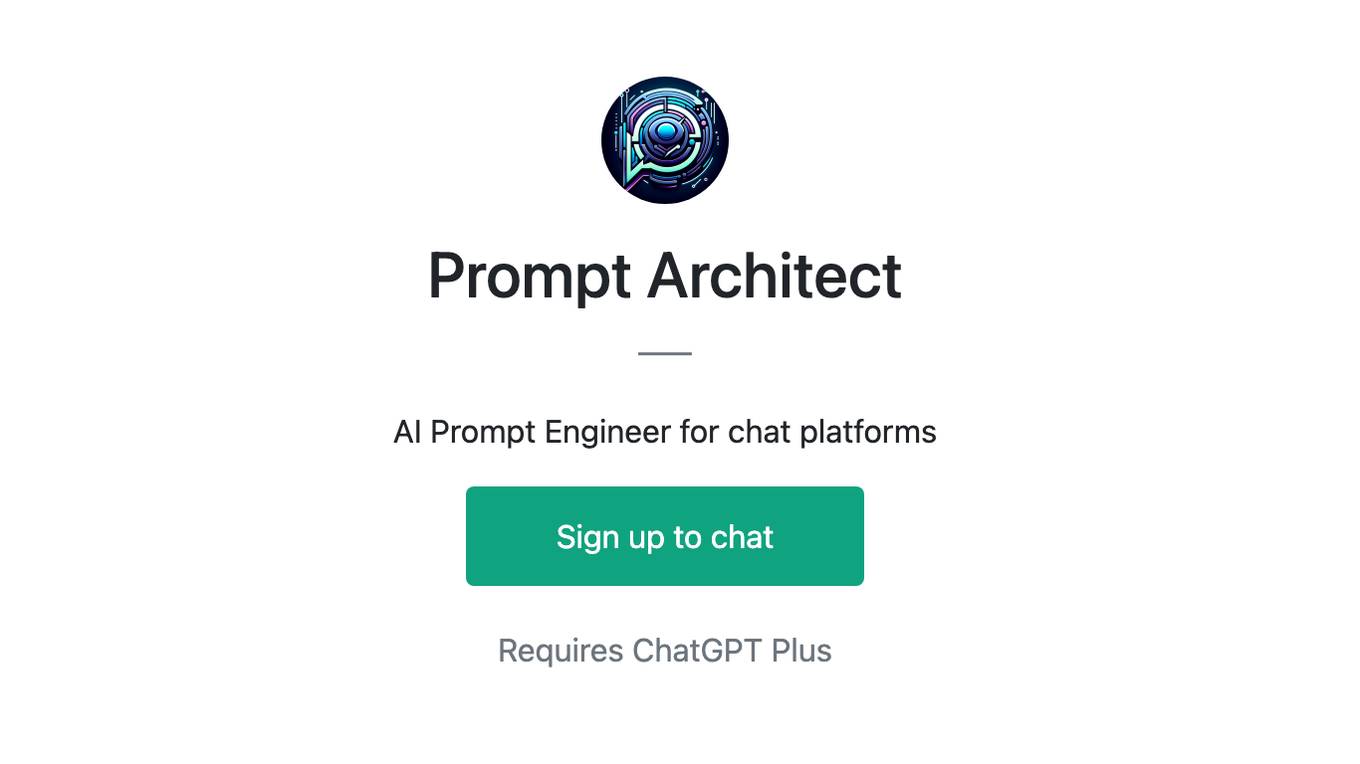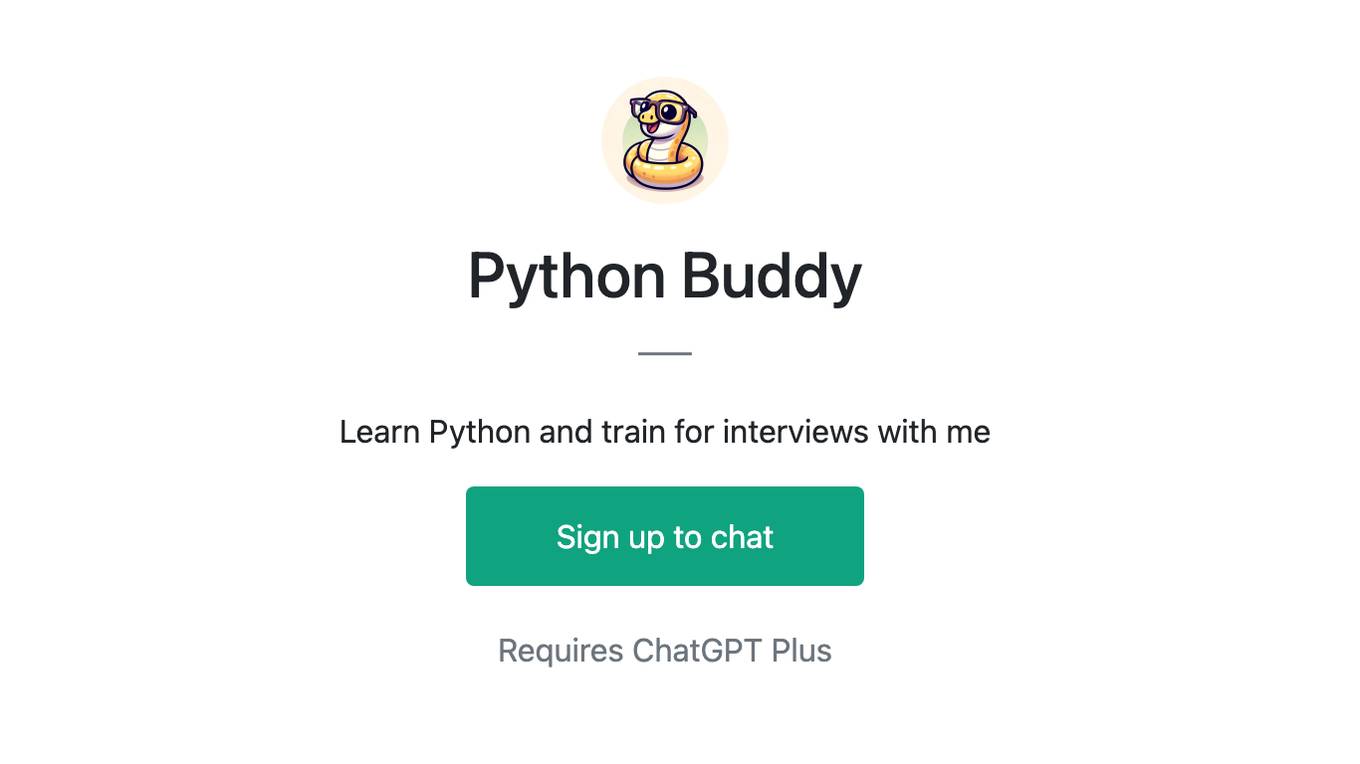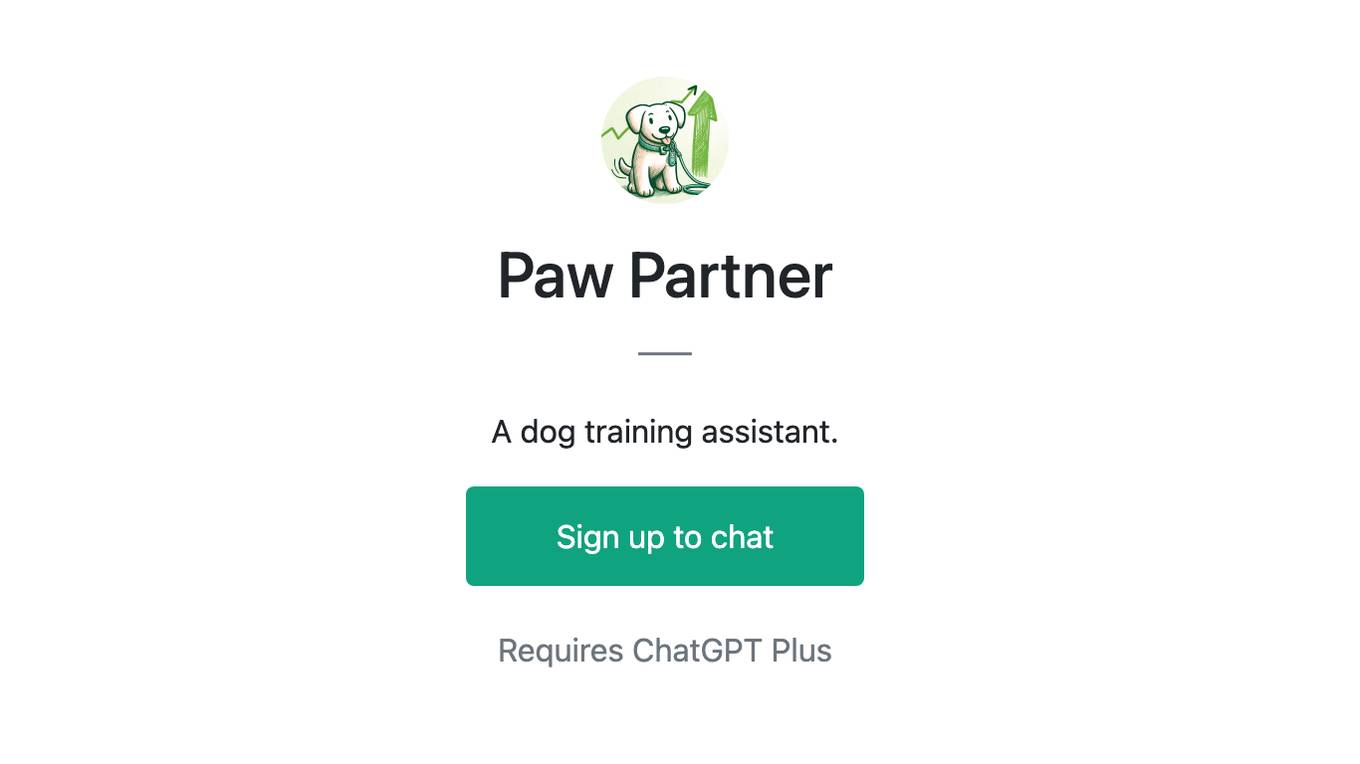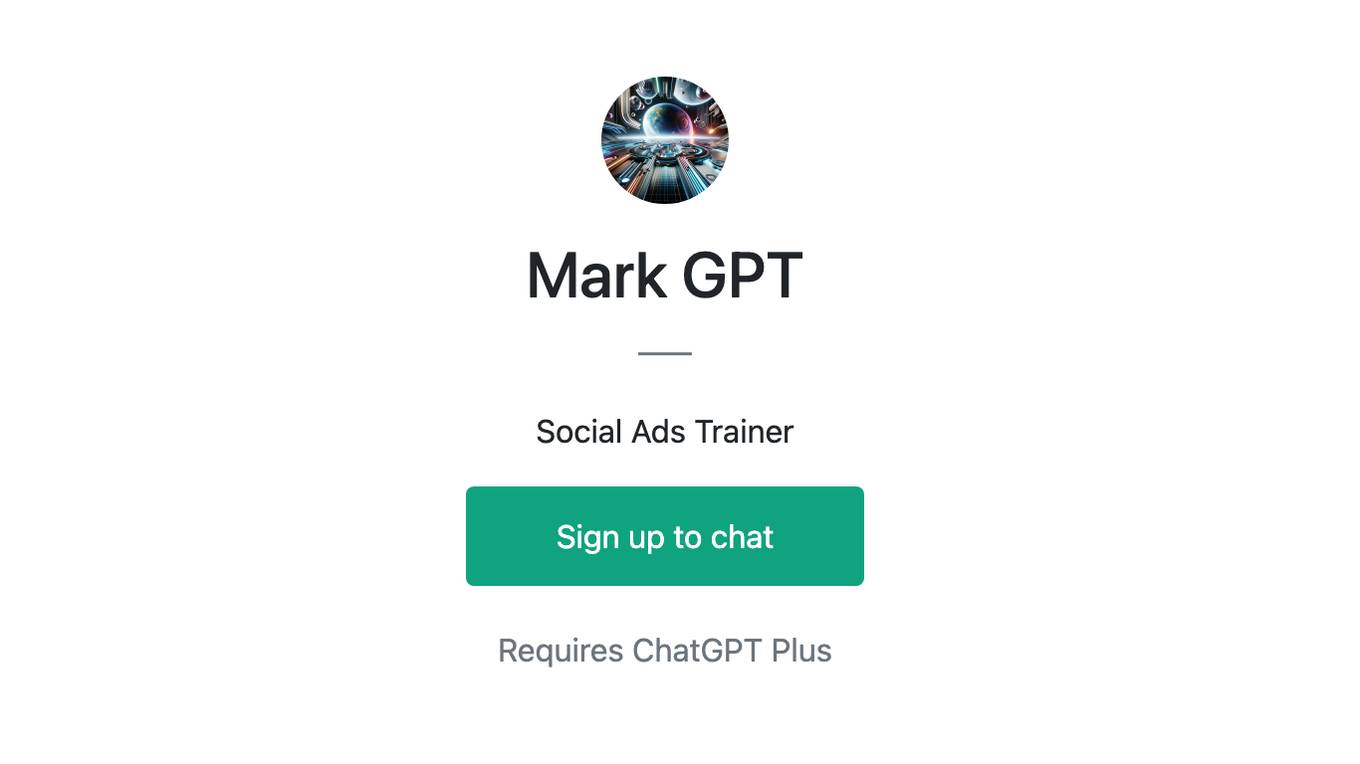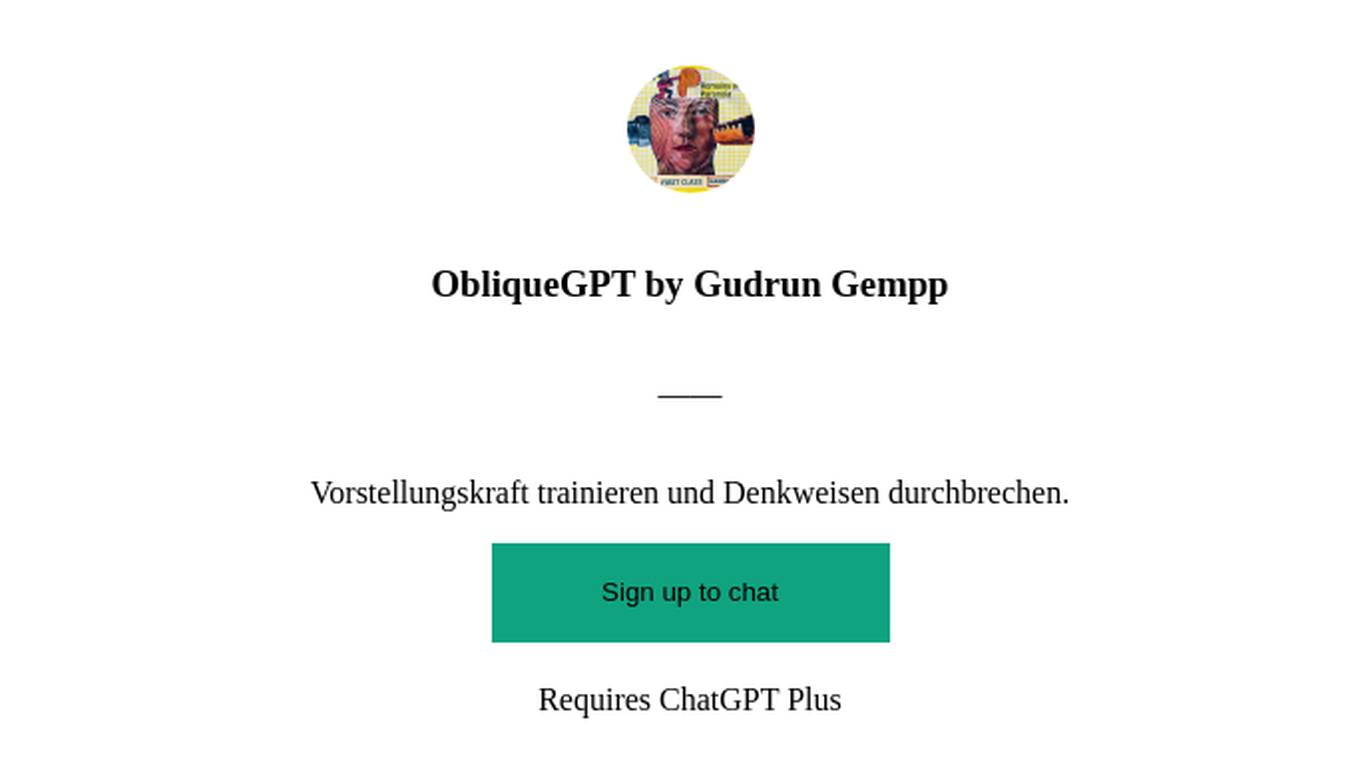Best AI tools for< Train Large Models >
20 - AI tool Sites

Ragobble
Ragobble is an audio to LLM data tool that allows you to easily convert audio files into text data that can be used to train large language models (LLMs). With Ragobble, you can quickly and easily create high-quality training data for your LLM projects.
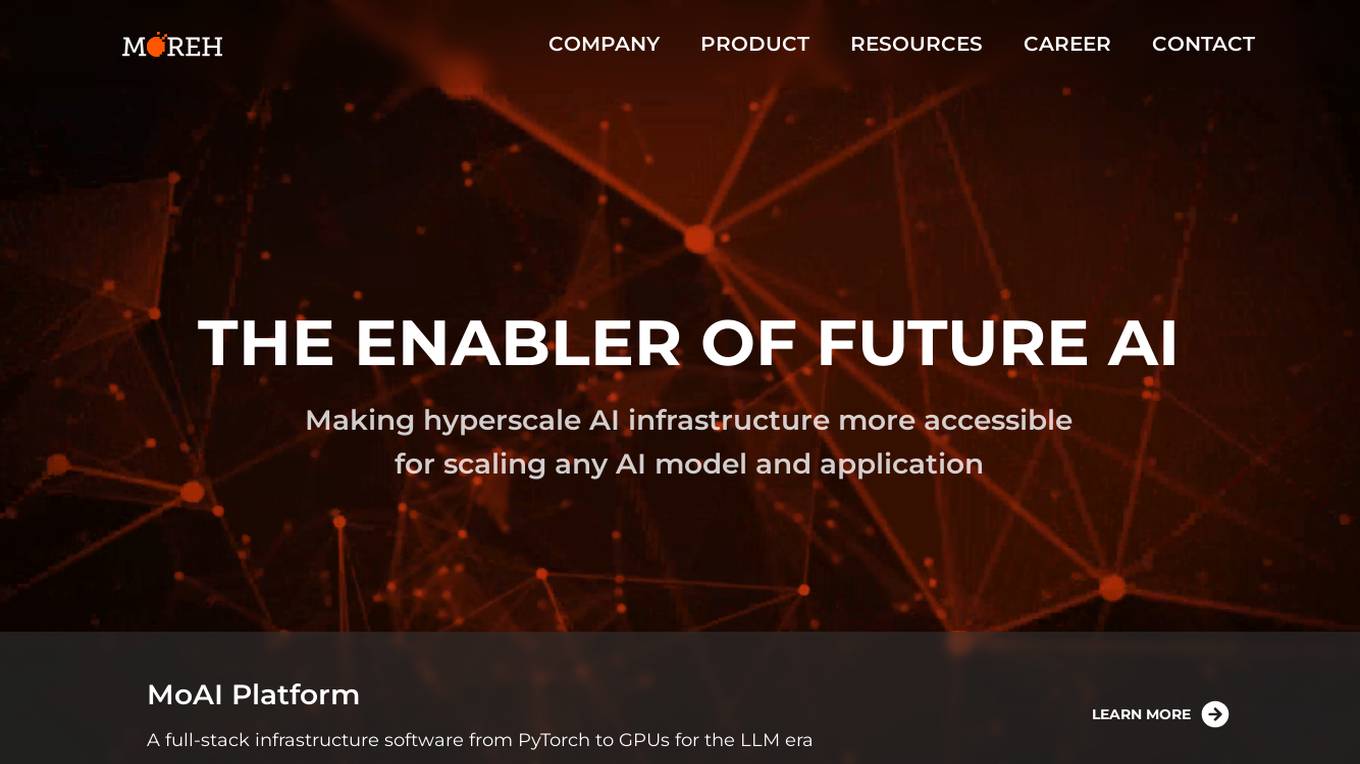
Moreh
Moreh is an AI platform that aims to make hyperscale AI infrastructure more accessible for scaling any AI model and application. It provides a full-stack infrastructure software from PyTorch to GPUs for the LLM era, enabling users to train large language models efficiently and effectively.
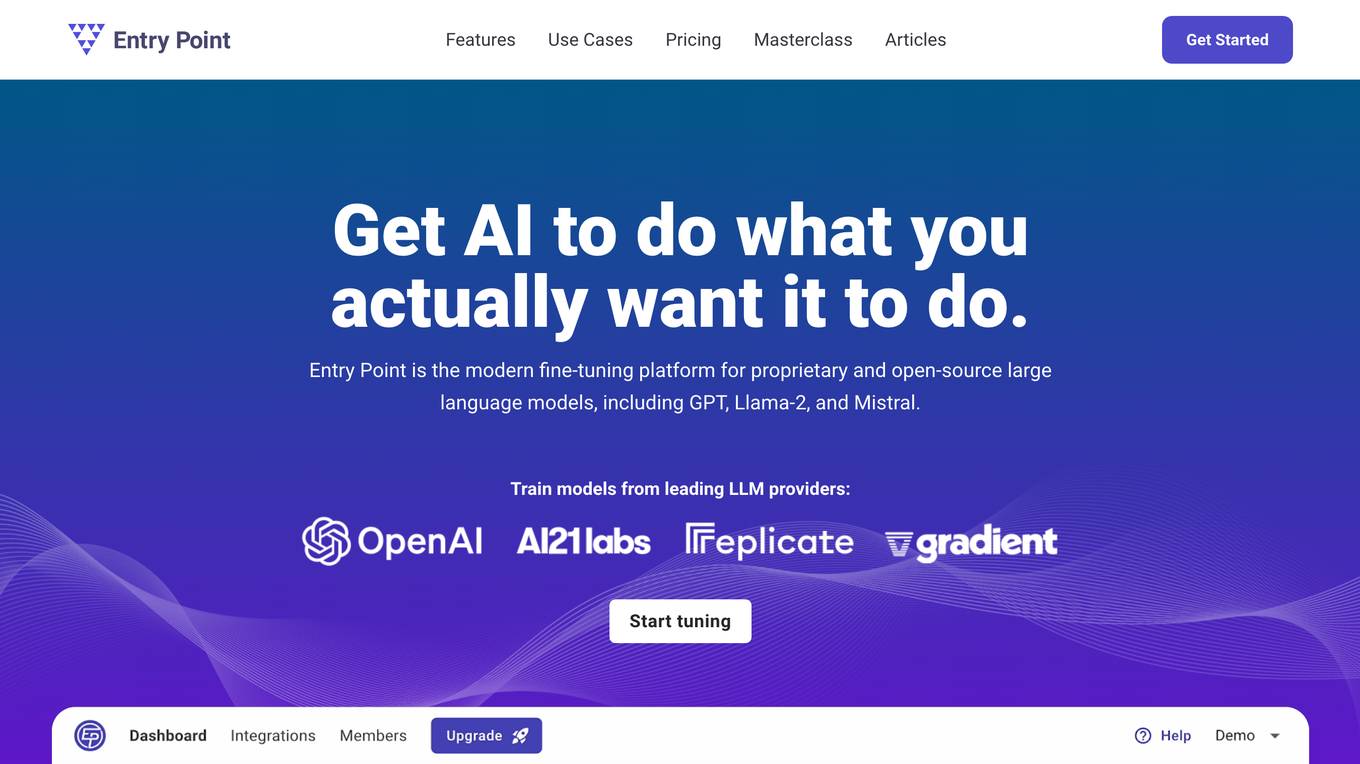
Entry Point AI
Entry Point AI is a modern AI optimization platform for fine-tuning proprietary and open-source language models. It provides a user-friendly interface to manage prompts, fine-tunes, and evaluations in one place. The platform enables users to optimize models from leading providers, train across providers, work collaboratively, write templates, import/export data, share models, and avoid common pitfalls associated with fine-tuning. Entry Point AI simplifies the fine-tuning process, making it accessible to users without the need for extensive data, infrastructure, or insider knowledge.

Denvr DataWorks AI Cloud
Denvr DataWorks AI Cloud is a cloud-based AI platform that provides end-to-end AI solutions for businesses. It offers a range of features including high-performance GPUs, scalable infrastructure, ultra-efficient workflows, and cost efficiency. Denvr DataWorks is an NVIDIA Elite Partner for Compute, and its platform is used by leading AI companies to develop and deploy innovative AI solutions.

Stockpulse
Stockpulse is an AI-powered platform that analyzes financial news and communities using Artificial Intelligence. It provides decision support for operations by collecting, filtering, and converting unstructured data into processable information. With extensive coverage of financial media sources globally, Stockpulse offers unique historical data, sentiment analysis, and AI-driven insights for various sectors in the financial markets.
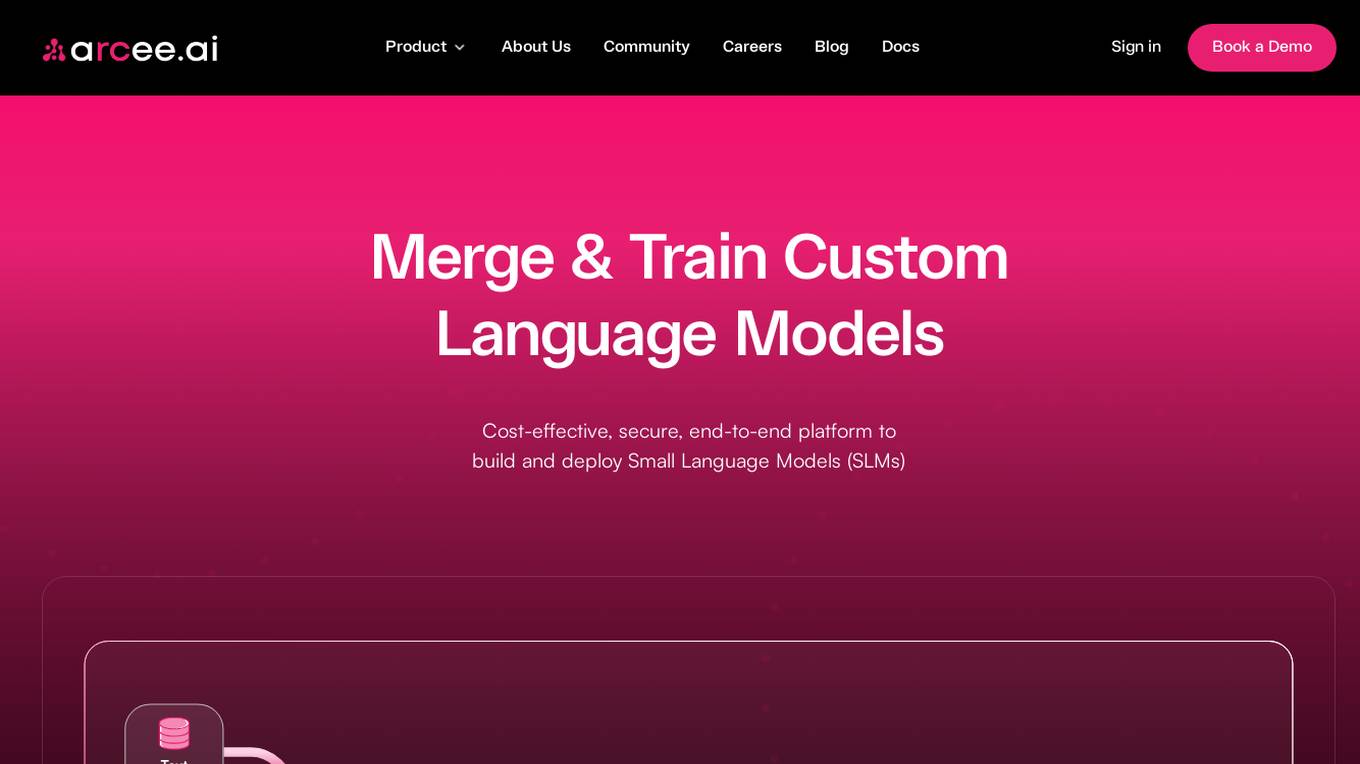
Arcee AI
Arcee AI is a platform that offers a cost-effective, secure, end-to-end solution for building and deploying Small Language Models (SLMs). It allows users to merge and train custom language models by leveraging open source models and their own data. The platform is known for its Model Merging technique, which combines the power of pre-trained Large Language Models (LLMs) with user-specific data to create high-performing models across various industries.
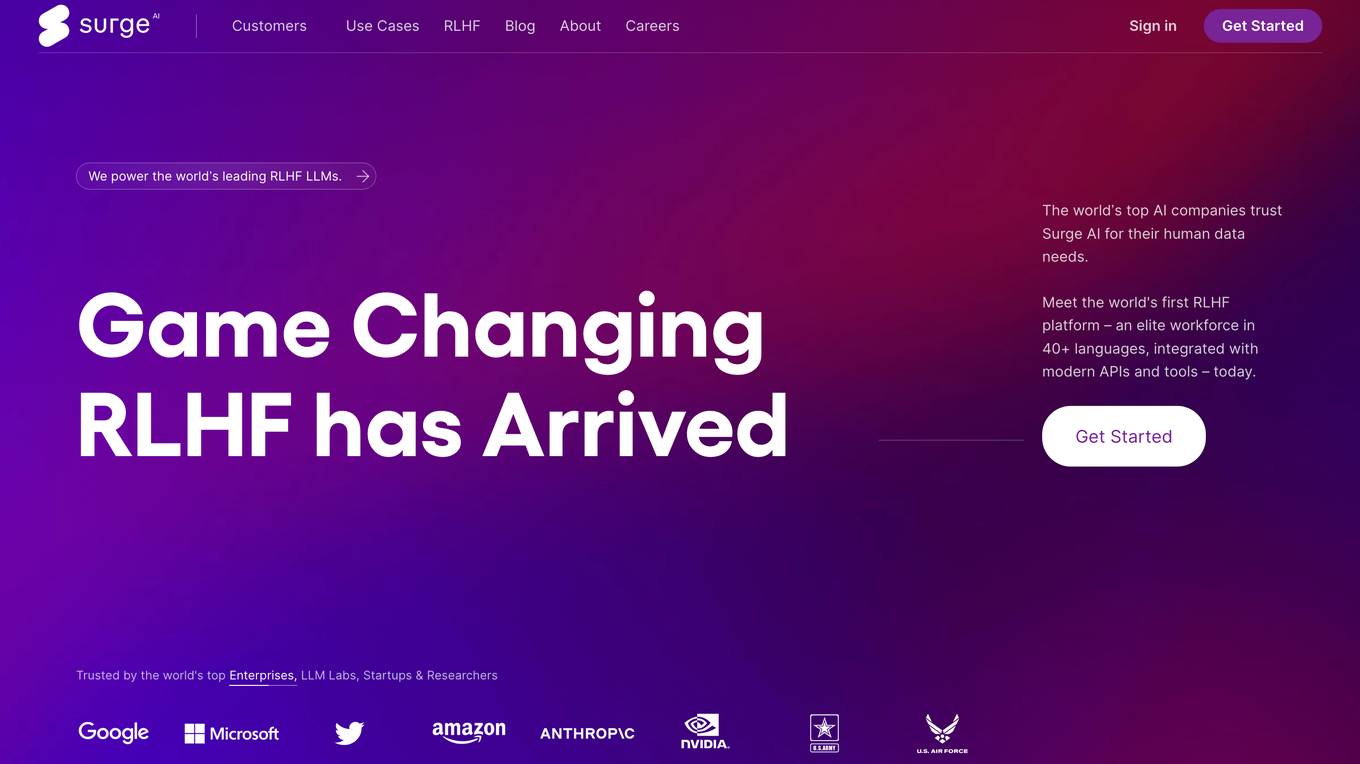
Surge AI
Surge AI is a data labeling platform that provides human-generated data for training and evaluating large language models (LLMs). It offers a global workforce of annotators who can label data in over 40 languages. Surge AI's platform is designed to be easy to use and integrates with popular machine learning tools and frameworks. The company's customers include leading AI companies, research labs, and startups.
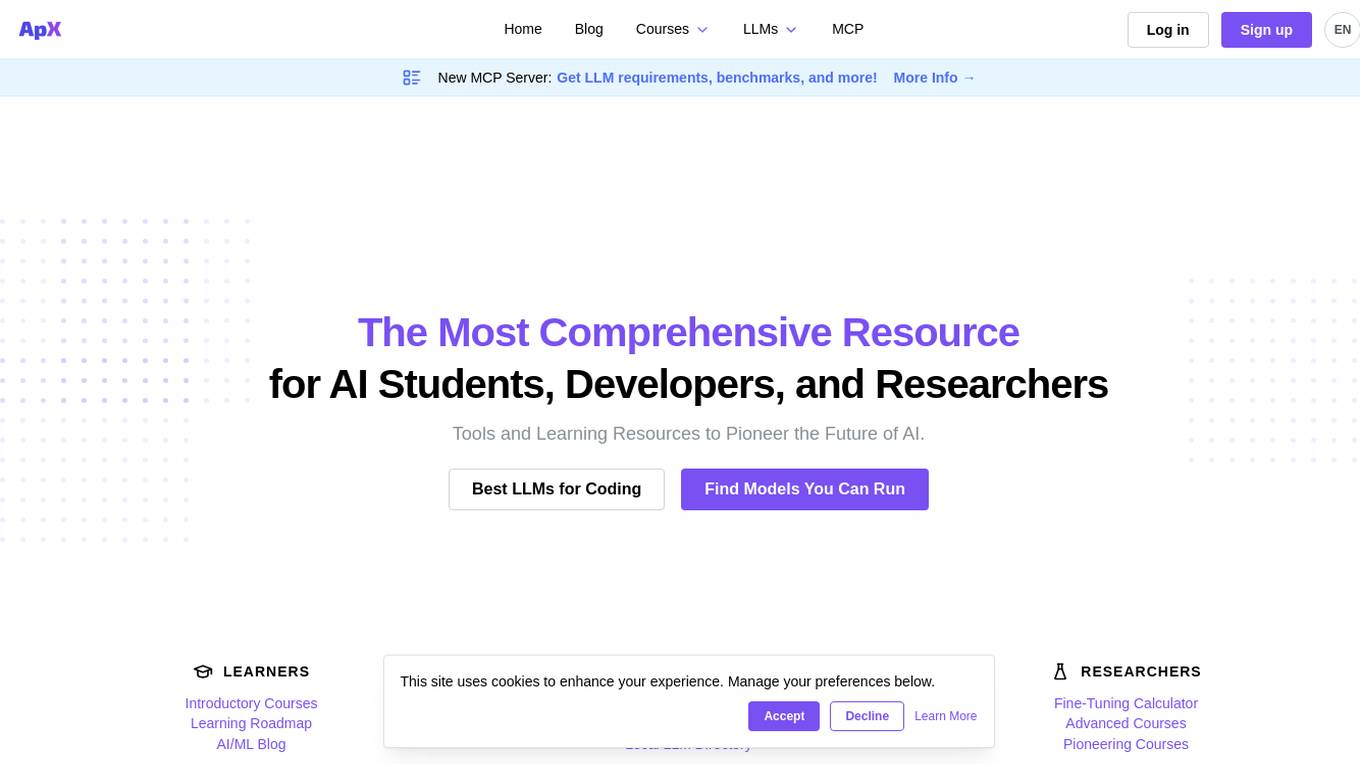
ApX Machine Learning
ApX Machine Learning is a comprehensive resource for AI students, developers, and researchers, offering tools and learning resources to pioneer the future of AI. It provides a wide range of courses, tools, and benchmarks for learners, developers, and researchers in the field of machine learning and artificial intelligence. The platform aims to enhance the capabilities of existing large language models (LLMs) through the Model Context Protocol (MCP), providing access to resources, benchmarks, and tools to improve LLM performance and efficiency.
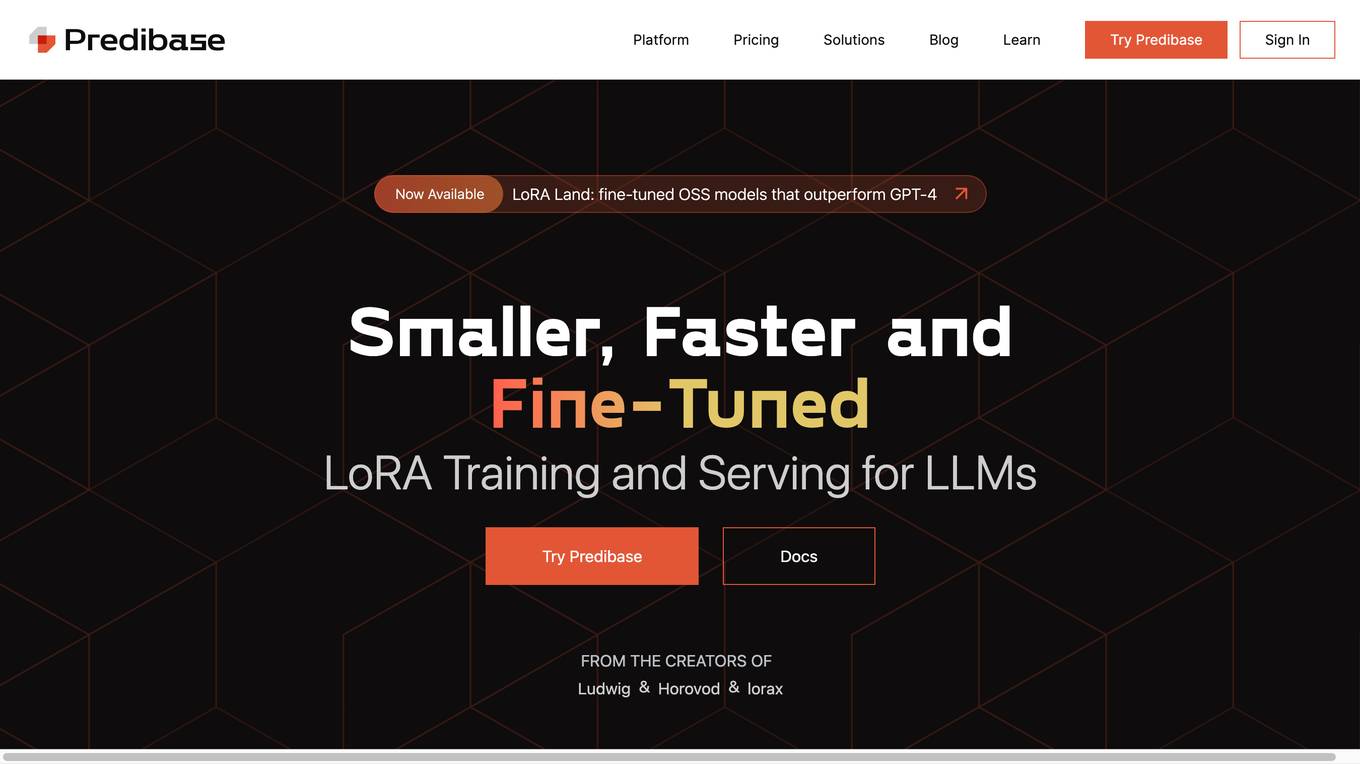
Predibase
Predibase is a platform for fine-tuning and serving Large Language Models (LLMs). It provides a cost-effective and efficient way to train and deploy LLMs for a variety of tasks, including classification, information extraction, customer sentiment analysis, customer support, code generation, and named entity recognition. Predibase is built on proven open-source technology, including LoRAX, Ludwig, and Horovod.
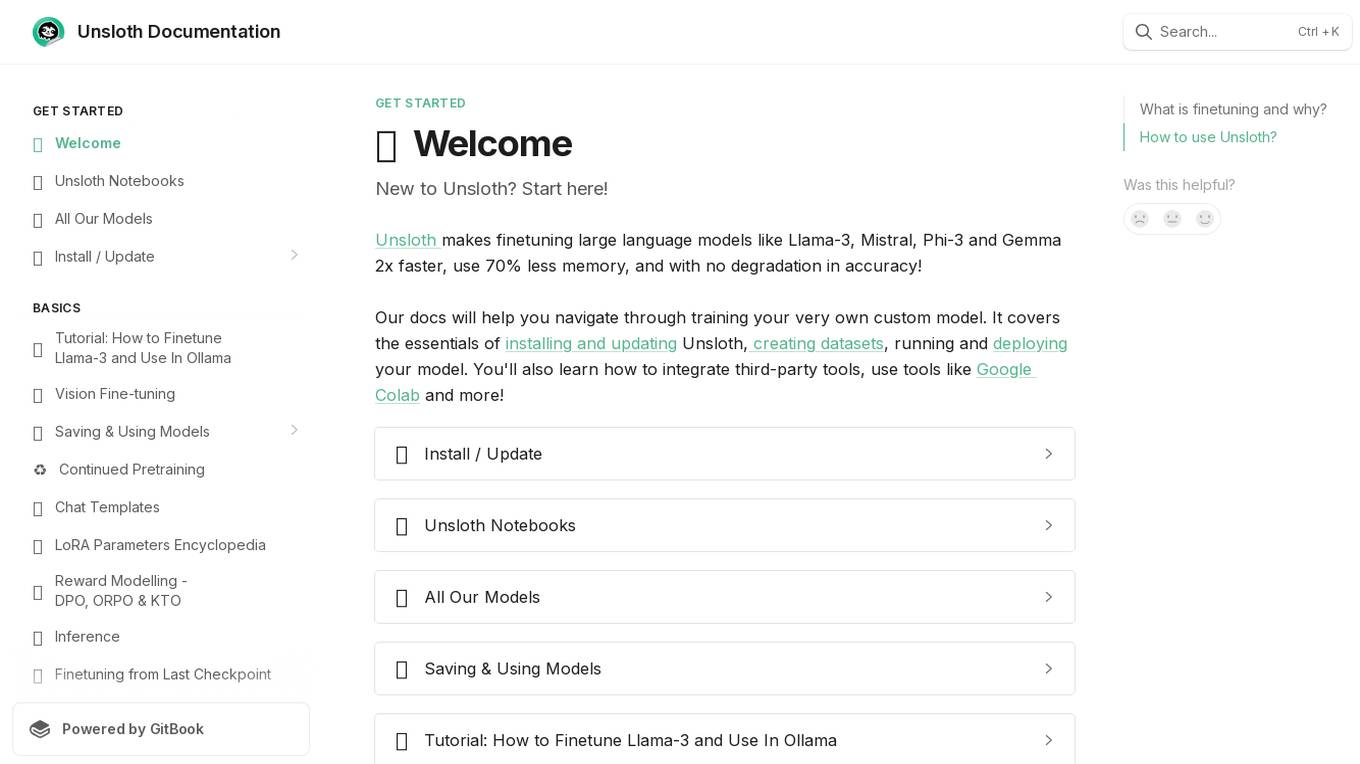
Unsloth
Unsloth is an AI tool designed to make finetuning large language models like Llama-3, Mistral, Phi-3, and Gemma 2x faster, use 70% less memory, and with no degradation in accuracy. The tool provides documentation to help users navigate through training their custom models, covering essentials such as installing and updating Unsloth, creating datasets, running, and deploying models. Users can also integrate third-party tools and utilize platforms like Google Colab.
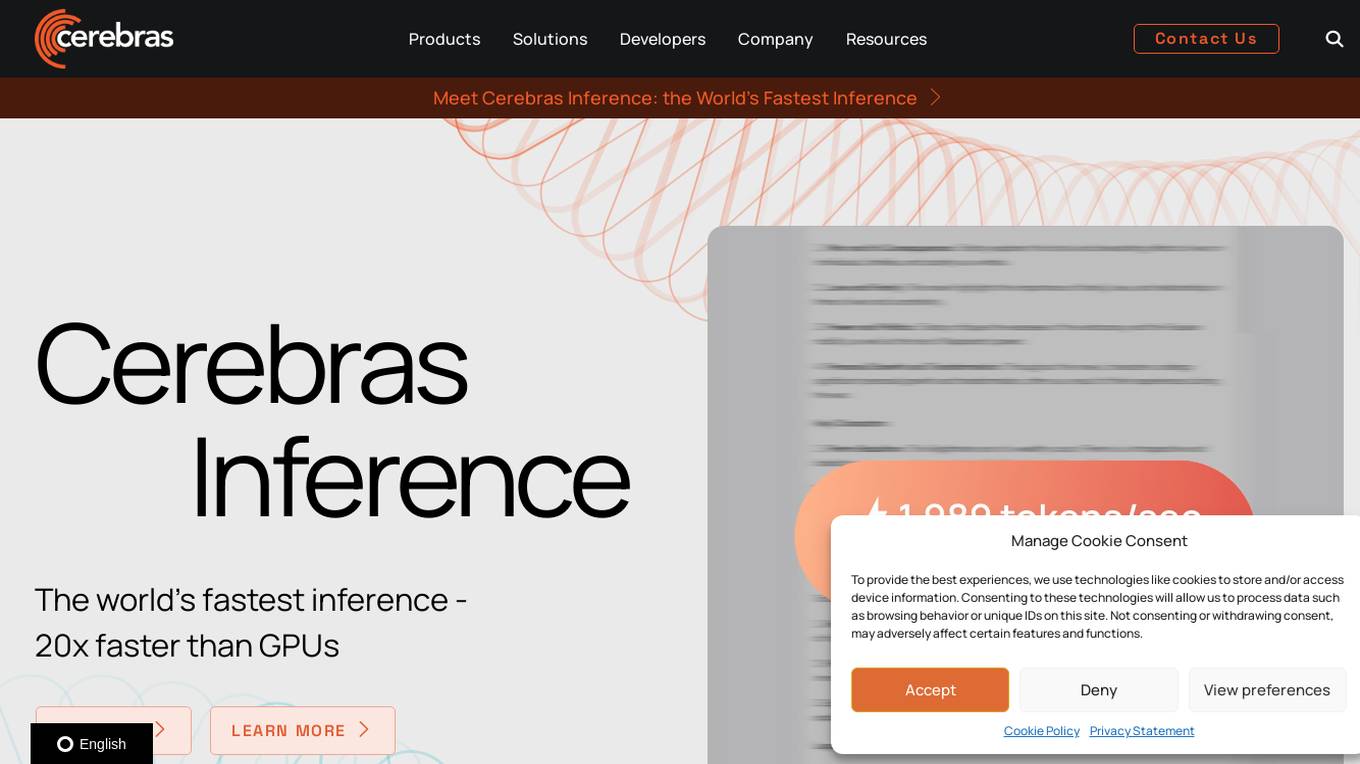
Cerebras
Cerebras is a leading AI tool and application provider that offers cutting-edge AI supercomputers, model services, and cloud solutions for various industries. The platform specializes in high-performance computing, large language models, and AI model training, catering to sectors such as health, energy, government, and financial services. Cerebras empowers developers and researchers with access to advanced AI models, open-source resources, and innovative hardware and software development kits.

Azure AI Platform
Azure AI Platform by Microsoft offers a comprehensive suite of artificial intelligence services and tools for developers and businesses. It provides a unified platform for building, training, and deploying AI models, as well as integrating AI capabilities into applications. With a focus on generative AI, multimodal models, and large language models, Azure AI empowers users to create innovative AI-driven solutions across various industries. The platform also emphasizes content safety, scalability, and agility in managing AI projects, making it a valuable resource for organizations looking to leverage AI technologies.
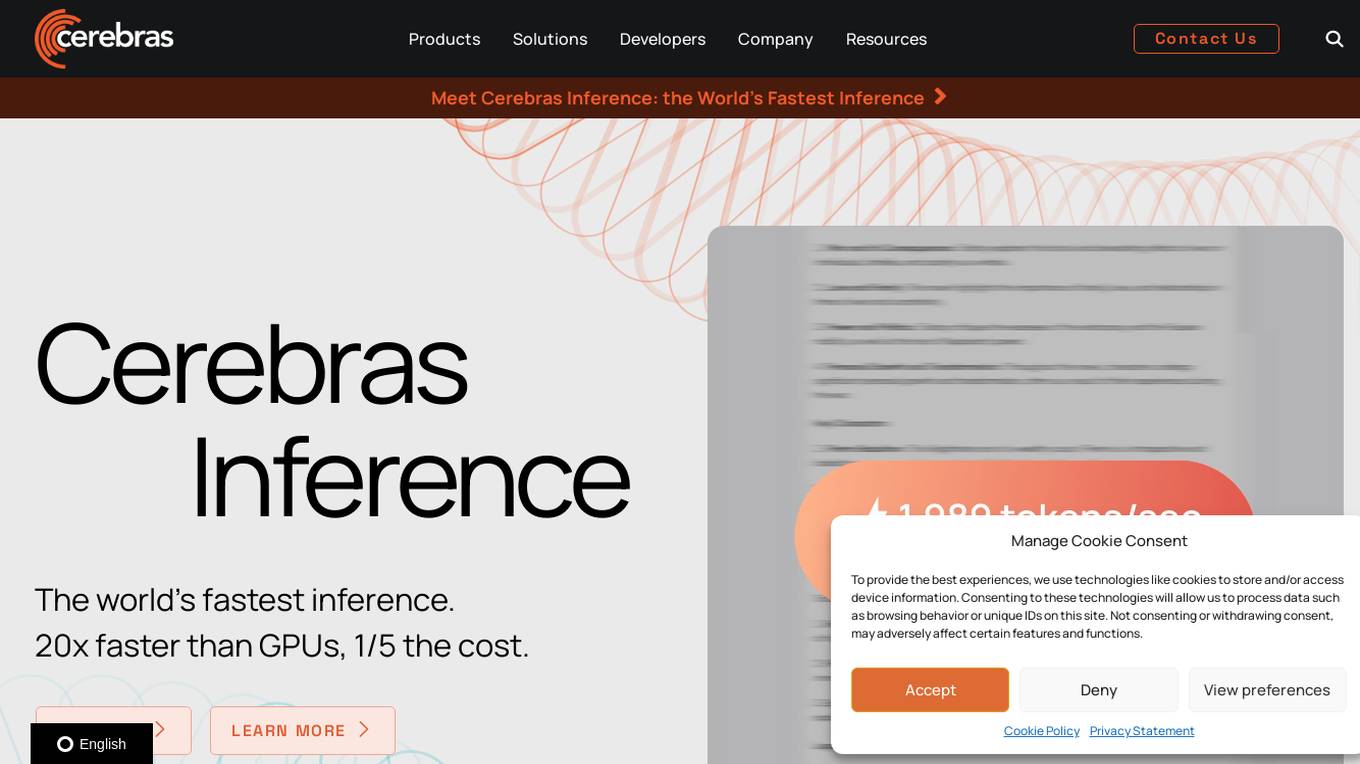
Cerebras
Cerebras is an AI tool that offers products and services related to AI supercomputers, cloud system processors, and applications for various industries. It provides high-performance computing solutions, including large language models, and caters to sectors such as health, energy, government, scientific computing, and financial services. Cerebras specializes in AI model services, offering state-of-the-art models and training services for tasks like multi-lingual chatbots and DNA sequence prediction. The platform also features the Cerebras Model Zoo, an open-source repository of AI models for developers and researchers.
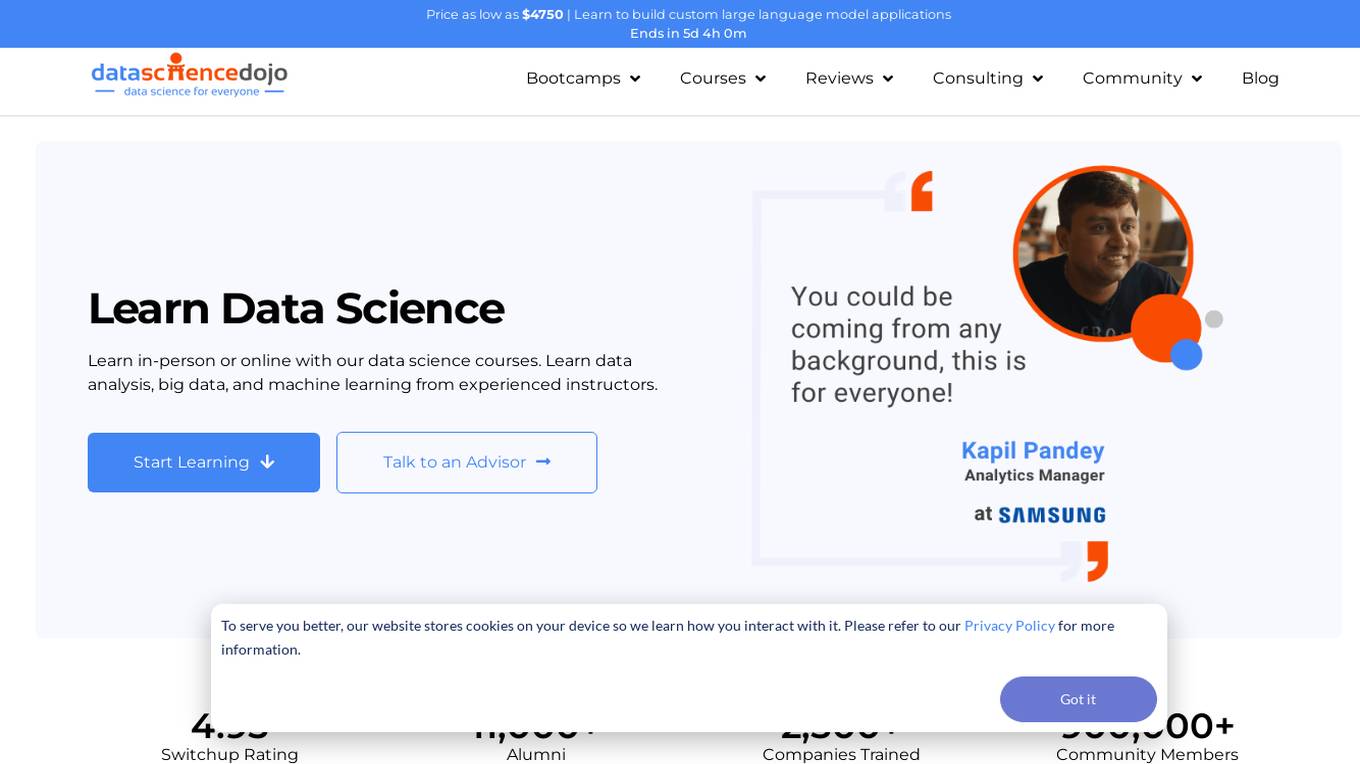
Data Science Dojo
Data Science Dojo is a globally recognized e-learning platform that offers programs in data science, data analytics, machine learning, and more. They provide comprehensive and hands-on training in various formats such as in-person, virtual instructor-led, and self-paced training. The focus is on helping students develop a think-business-first mindset to apply their data science skills effectively in real-world scenarios. With over 2500 enterprises trained, Data Science Dojo aims to make data science accessible to everyone.
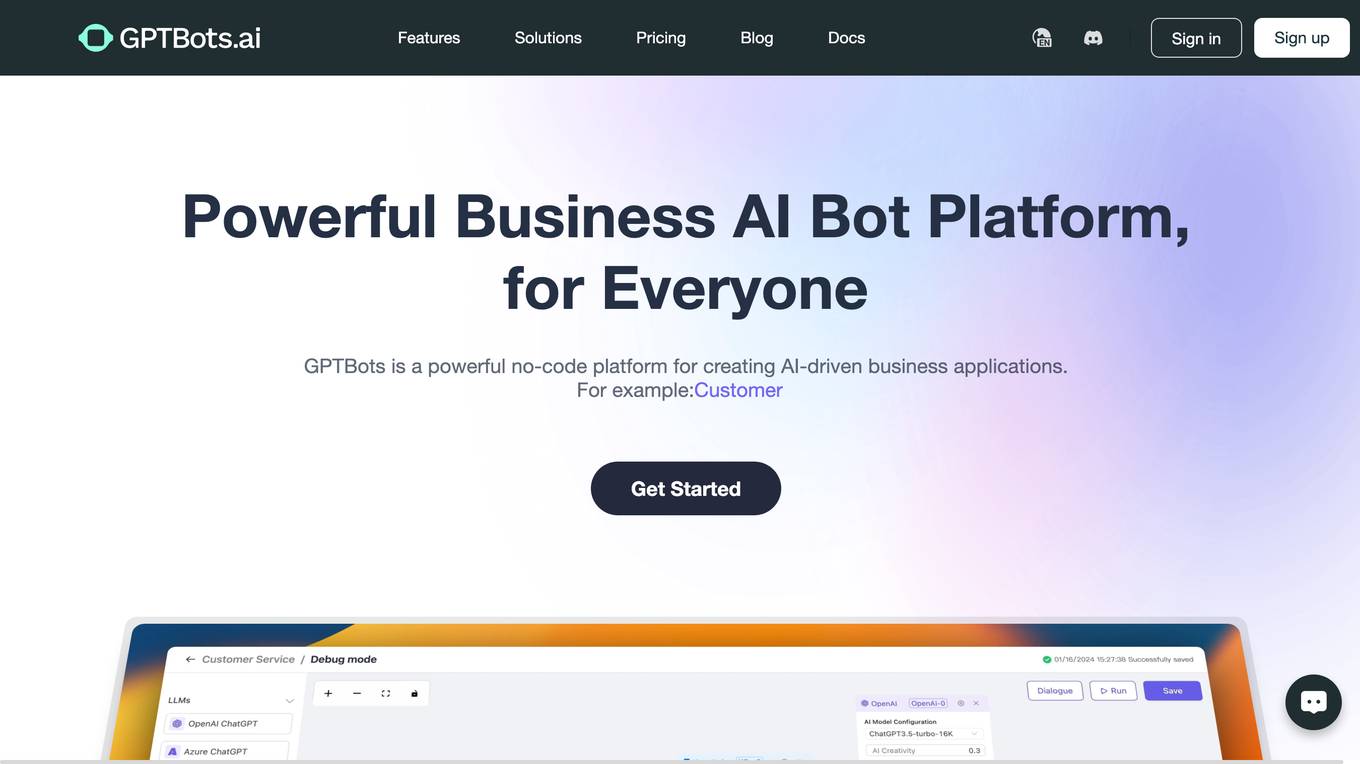
GPTBots
GPTBots.ai is a powerful no-code platform for creating AI-driven business applications. It seamlessly integrates large language models with organizational data, services, and workflows to empower AI bots in driving business growth. The platform allows users to build and train AI bots without coding experience, access best-practice AI bot templates, optimize and customize AI knowledge base, and adapt to various scenarios with intelligent agent bots. GPTBots supports diverse input types, offers versatile language models, enables seamless chatbot-human handoff, and provides robust API and SDK for embedding capabilities into products. Trusted by over 100k companies worldwide, GPTBots helps enterprises enhance customer service, leads generation, SEO writing, data analysis, and more.
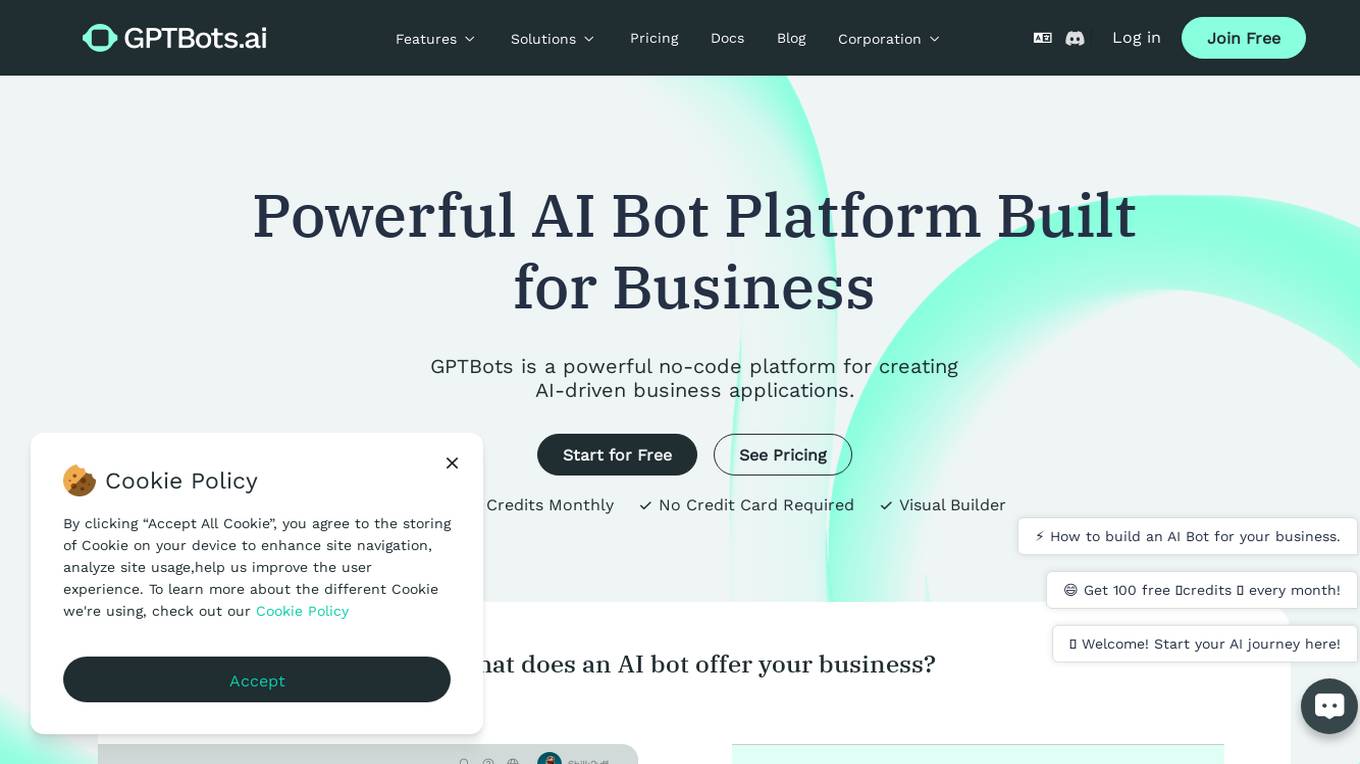
GPTBots
GPTBots.ai is a powerful no-code platform for creating AI-driven business applications. It seamlessly integrates large language models with organizational data, services, and workflows to empower AI bots in driving business growth. The platform allows users to build and train AI bots without coding experience, access best-practice templates, optimize AI knowledge bases, and adapt to various scenarios with intelligent agent bots. GPTBots supports diverse input types, offers versatile language models, and enables seamless chatbot-human handoff. Trusted by over 100k companies worldwide, GPTBots enhances customer support, leads generation, SEO writing, and data analysis, catering to various industries.
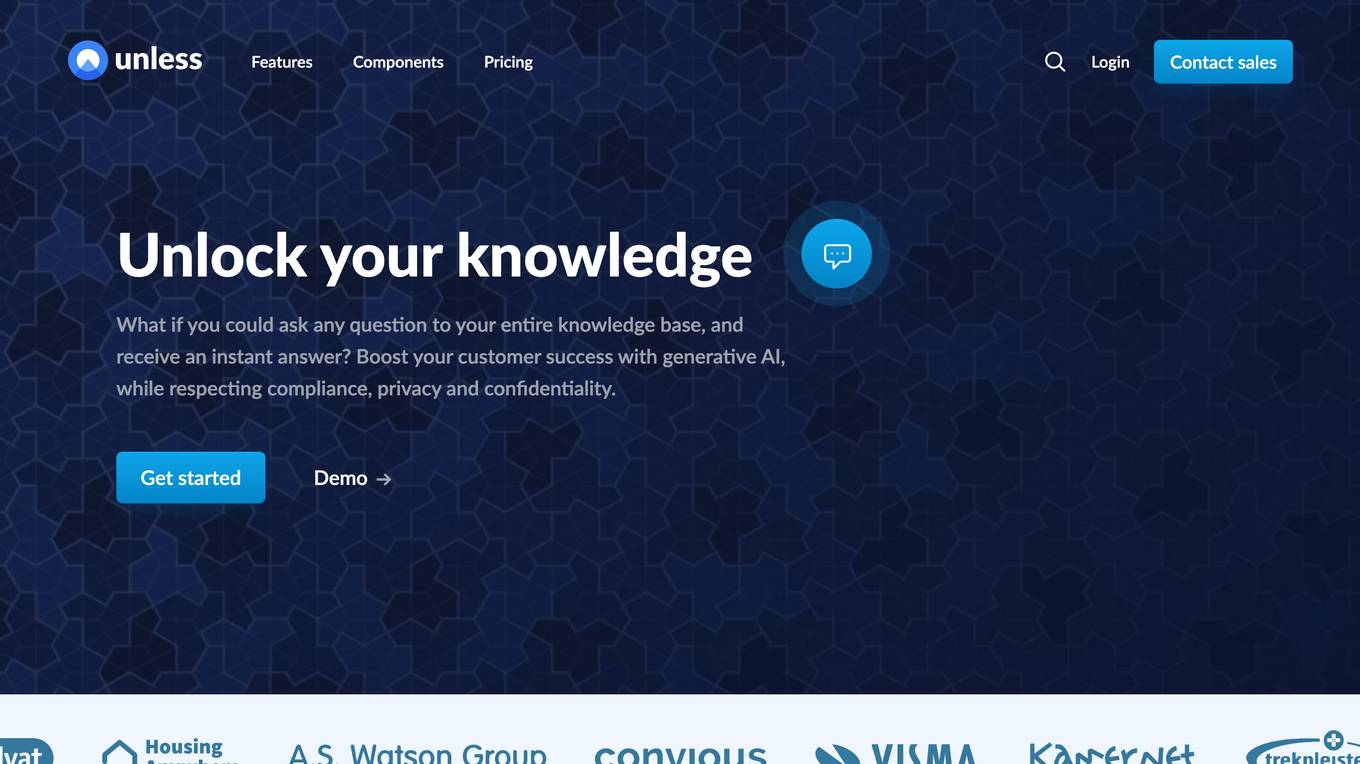
Unless
Unless is a conversational AI platform that helps organizations unlock their knowledge and provide better customer support. With Unless, you can train an AI model with your own knowledge base, documents, or website, and then let your customers or team engage in conversations with the AI through various channels. Unless is designed to be easy to use, even for non-technical staff, and it offers a variety of features to help you get the most out of your AI model.
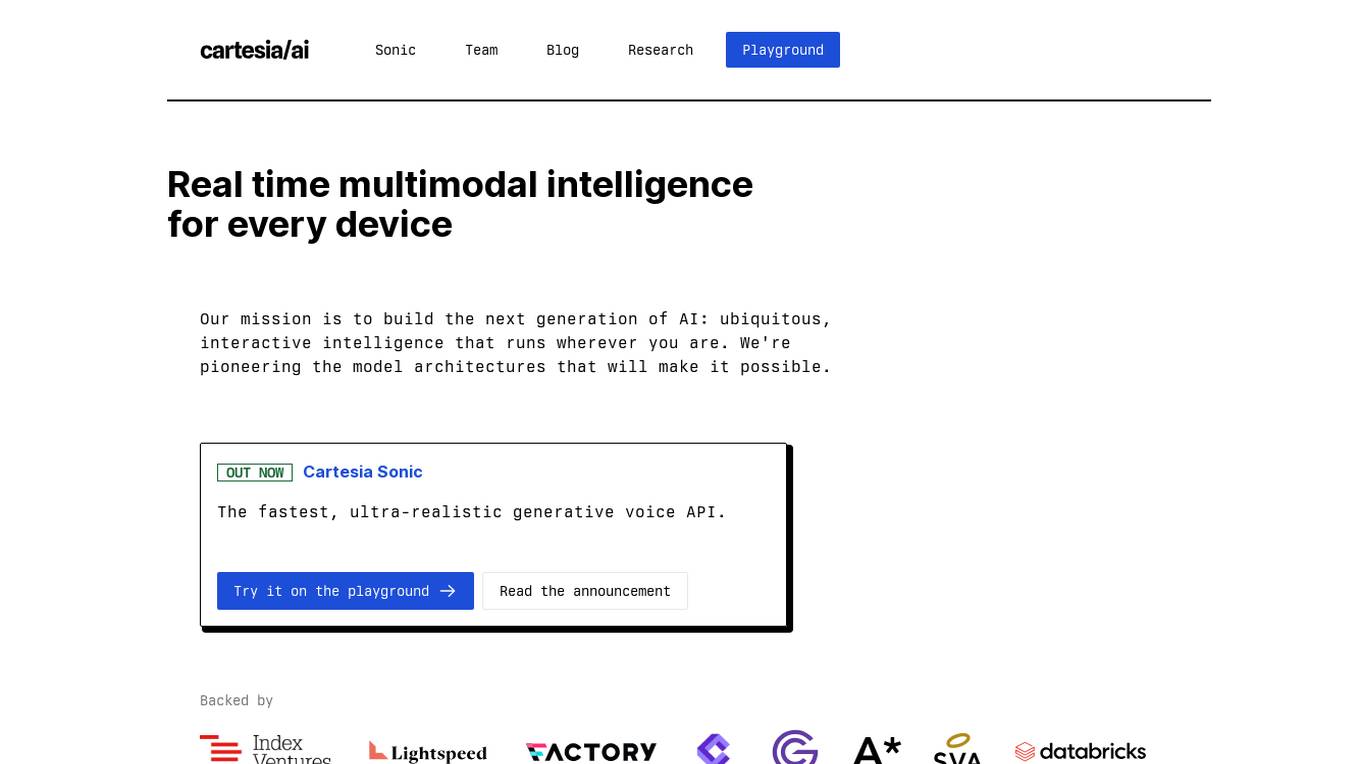
Cartesia Sonic Team Blog Research Playground
Cartesia Sonic Team Blog Research Playground is an AI application that offers real-time multimodal intelligence for every device. The application aims to build the next generation of AI by providing ubiquitous, interactive intelligence that can run on any device. It features the fastest, ultra-realistic generative voice API and is backed by research on simple linear attention language models and state-space models. The founding team, who met at the Stanford AI Lab, has invented State Space Models (SSMs) and scaled it up to achieve state-of-the-art results in various modalities such as text, audio, video, images, and time-series data.
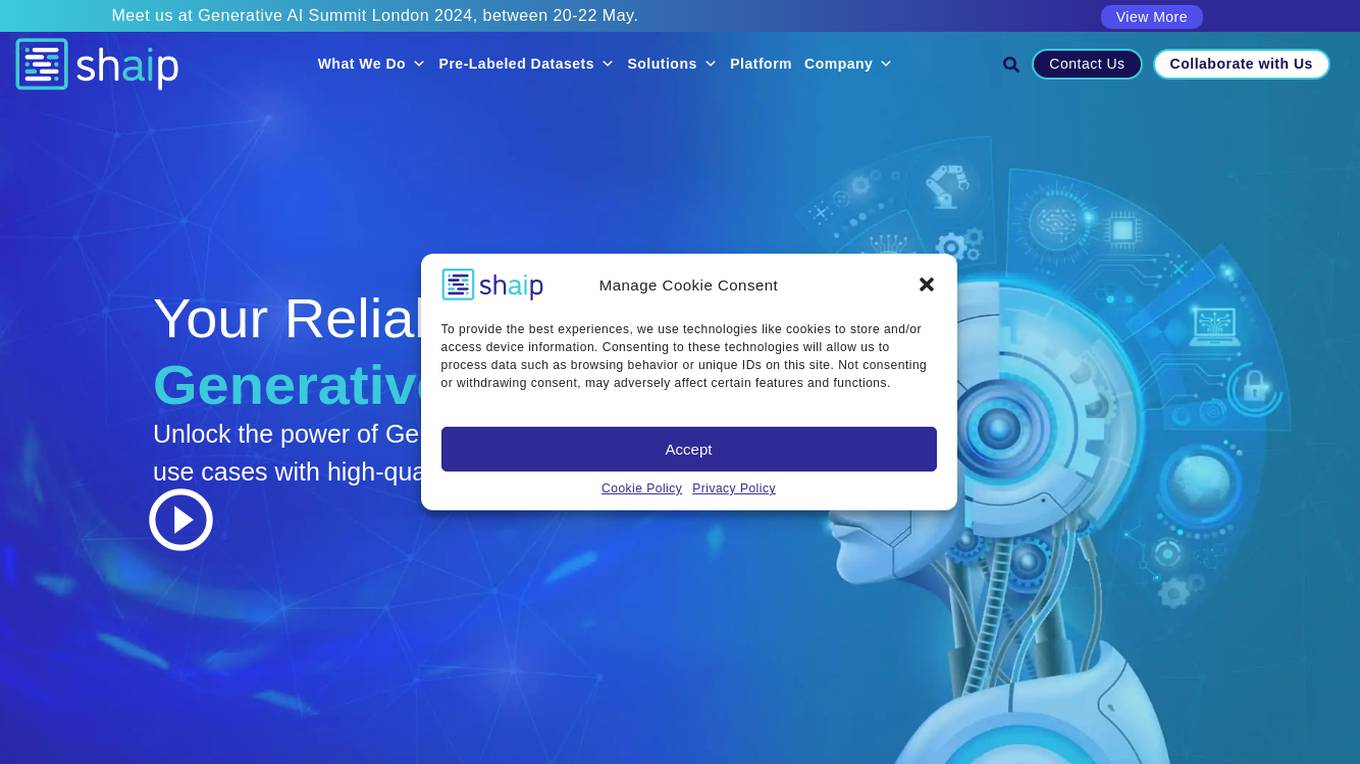
Shaip
Shaip is a human-powered data processing service specializing in AI and ML models. They offer a wide range of services including data collection, annotation, de-identification, and more. Shaip provides high-quality training data for various AI applications, such as healthcare AI, conversational AI, and computer vision. With over 15 years of expertise, Shaip helps organizations unlock critical information from unstructured data, enabling them to achieve better results in their AI initiatives.
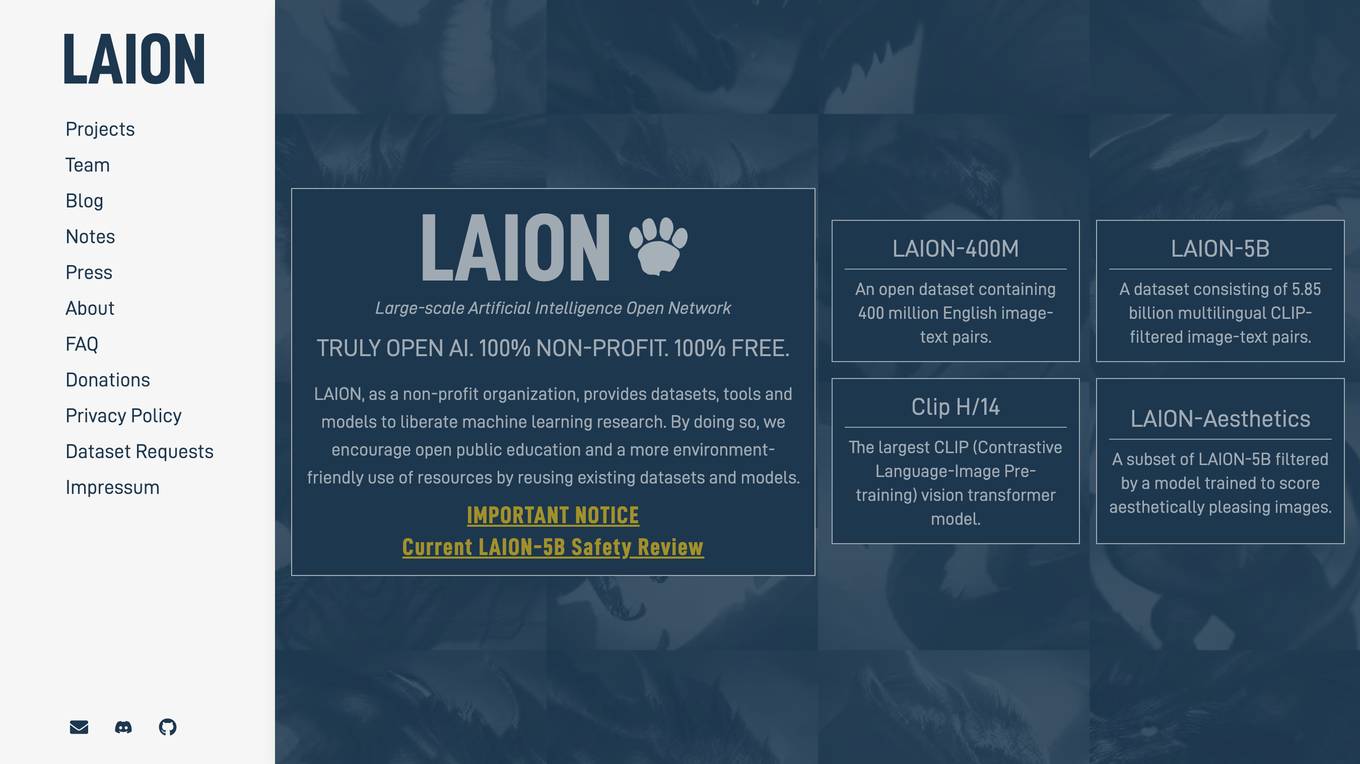
LAION
LAION is a non-profit organization that provides datasets, tools, and models to advance machine learning research. The organization's goal is to promote open public education and encourage the reuse of existing datasets and models to reduce the environmental impact of machine learning research.
8 - Open Source AI Tools
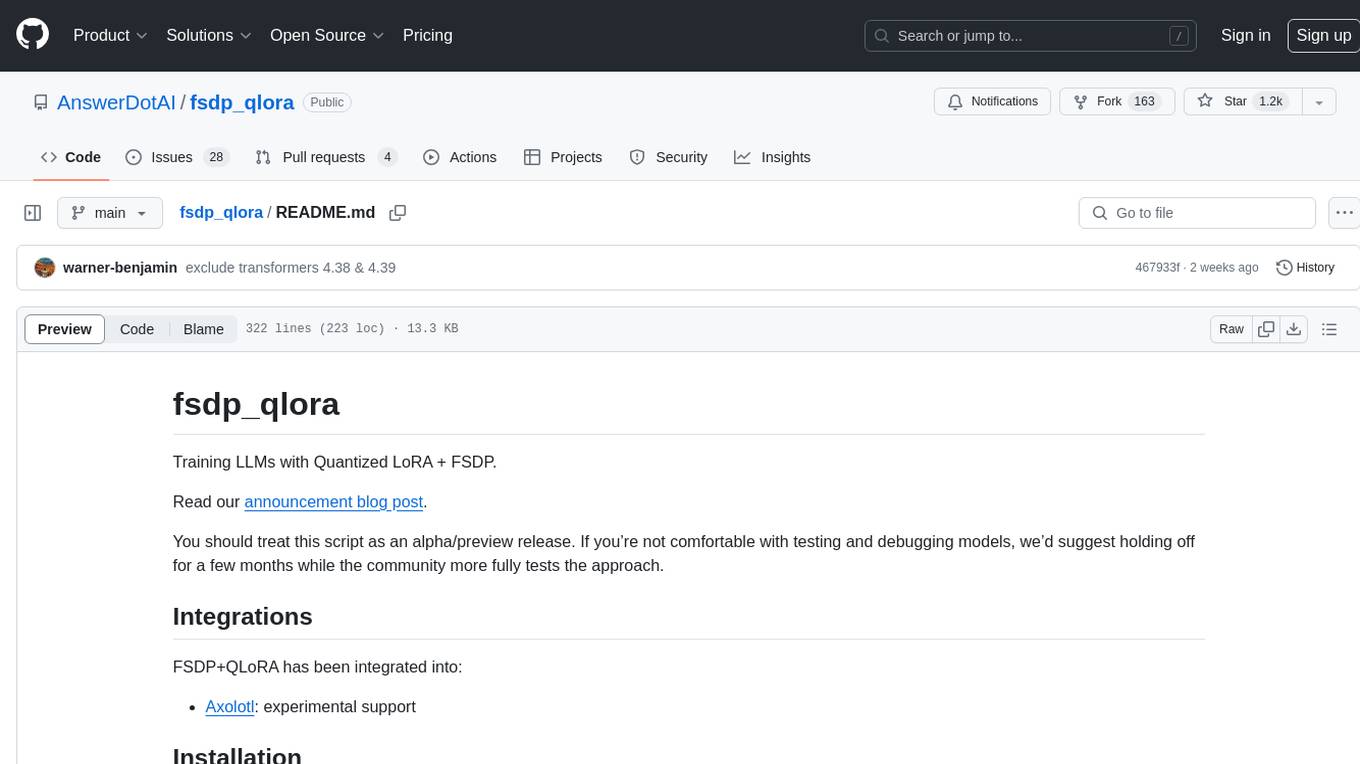
fsdp_qlora
The fsdp_qlora repository provides a script for training Large Language Models (LLMs) with Quantized LoRA and Fully Sharded Data Parallelism (FSDP). It integrates FSDP+QLoRA into the Axolotl platform and offers installation instructions for dependencies like llama-recipes, fastcore, and PyTorch. Users can finetune Llama-2 70B on Dual 24GB GPUs using the provided command. The script supports various training options including full params fine-tuning, LoRA fine-tuning, custom LoRA fine-tuning, quantized LoRA fine-tuning, and more. It also discusses low memory loading, mixed precision training, and comparisons to existing trainers. The repository addresses limitations and provides examples for training with different configurations, including BnB QLoRA and HQQ QLoRA. Additionally, it offers SLURM training support and instructions for adding support for a new model.
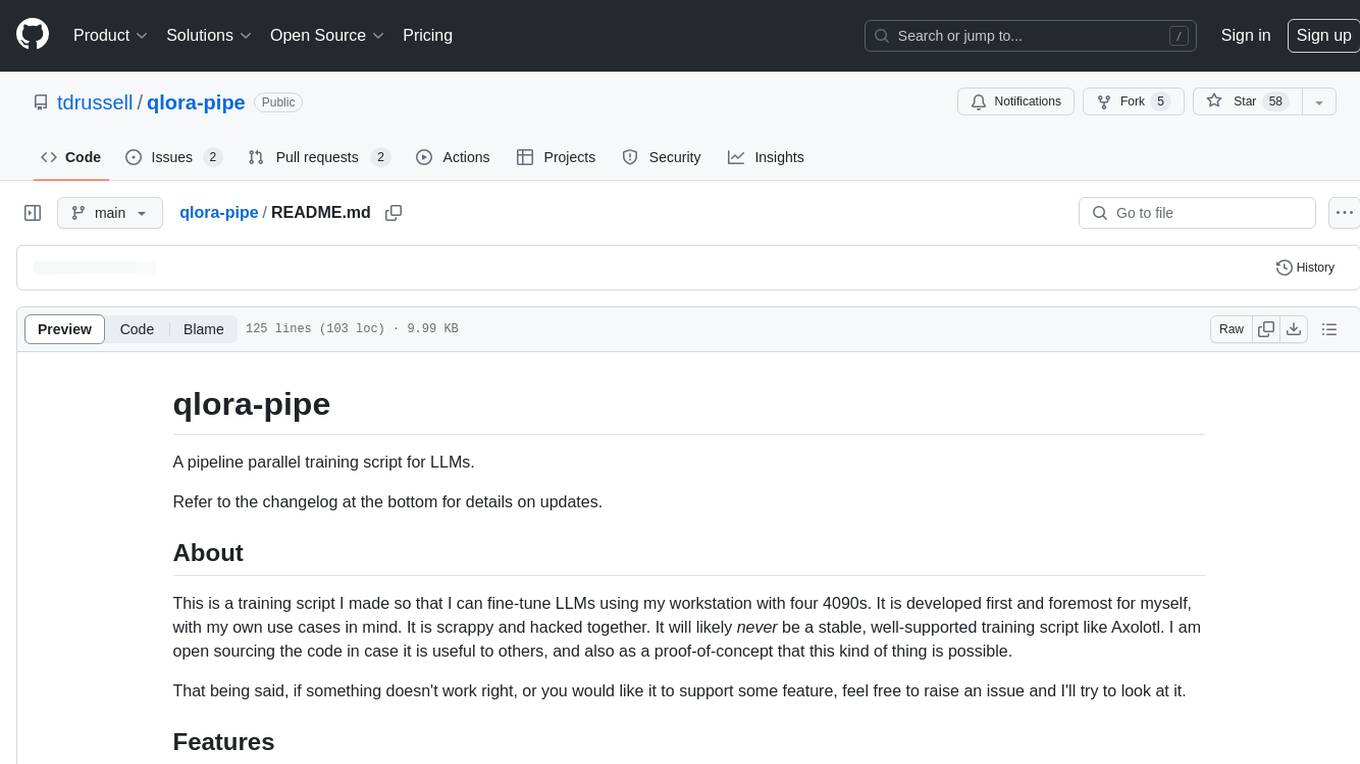
qlora-pipe
qlora-pipe is a pipeline parallel training script designed for efficiently training large language models that cannot fit on one GPU. It supports QLoRA, LoRA, and full fine-tuning, with efficient model loading and the ability to load any dataset that Axolotl can handle. The script allows for raw text training, resuming training from a checkpoint, logging metrics to Tensorboard, specifying a separate evaluation dataset, training on multiple datasets simultaneously, and supports various models like Llama, Mistral, Mixtral, Qwen-1.5, and Cohere (Command R). It handles pipeline- and data-parallelism using Deepspeed, enabling users to set the number of GPUs, pipeline stages, and gradient accumulation steps for optimal utilization.
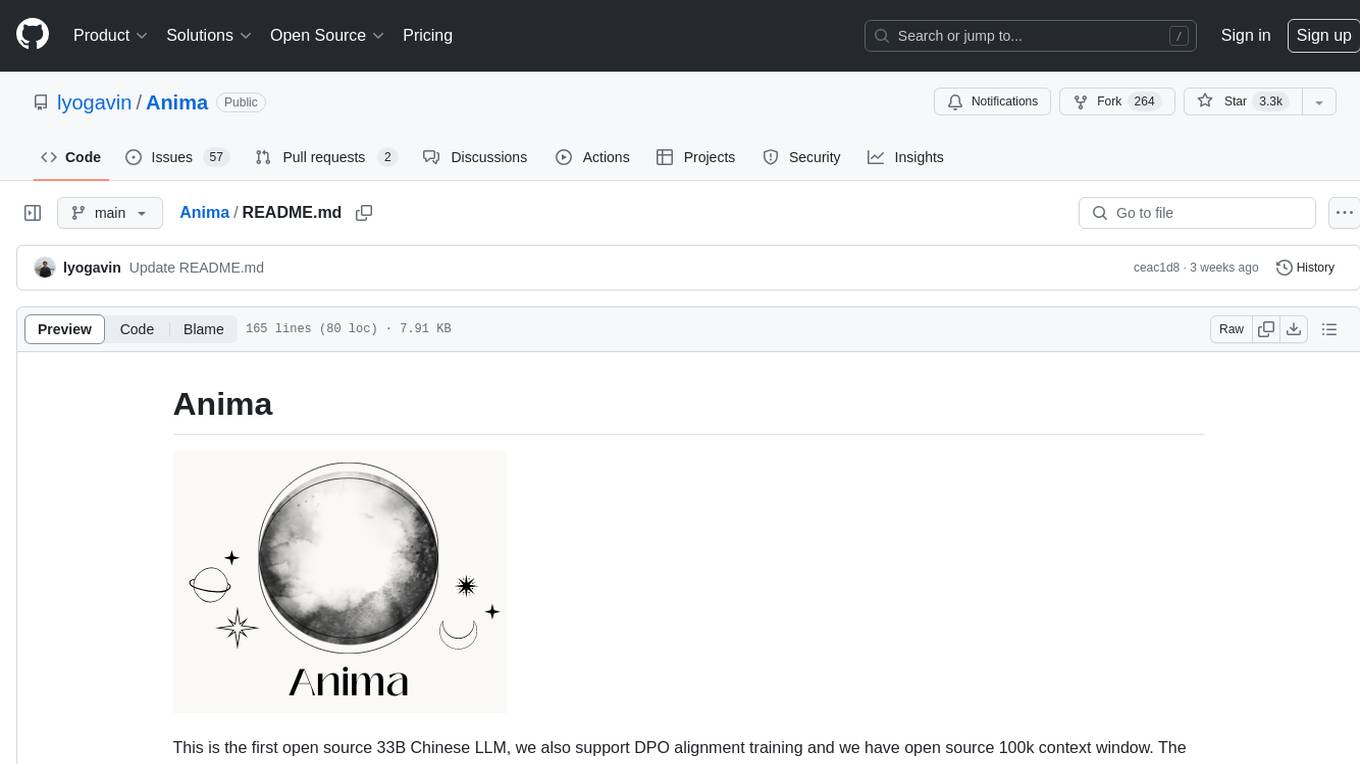
Anima
Anima is the first open-source 33B Chinese large language model based on QLoRA, supporting DPO alignment training and open-sourcing a 100k context window model. The latest update includes AirLLM, a library that enables inference of 70B LLM from a single GPU with just 4GB memory. The tool optimizes memory usage for inference, allowing large language models to run on a single 4GB GPU without the need for quantization or other compression techniques. Anima aims to democratize AI by making advanced models accessible to everyone and contributing to the historical process of AI democratization.
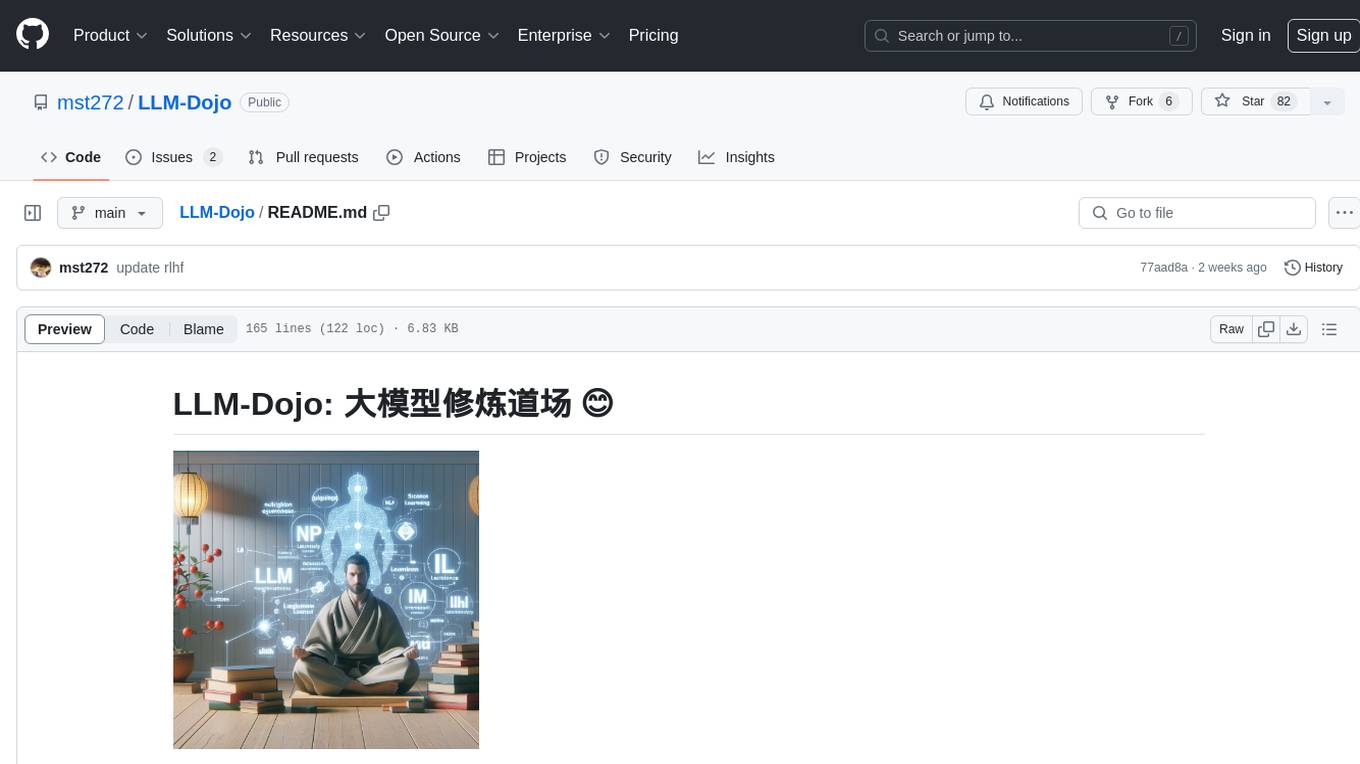
LLM-Dojo
LLM-Dojo is an open-source platform for learning and practicing large models, providing a framework for building custom large model training processes, implementing various tricks and principles in the llm_tricks module, and mainstream model chat templates. The project includes an open-source large model training framework, detailed explanations and usage of the latest LLM tricks, and a collection of mainstream model chat templates. The term 'Dojo' symbolizes a place dedicated to learning and practice, borrowing its meaning from martial arts training.
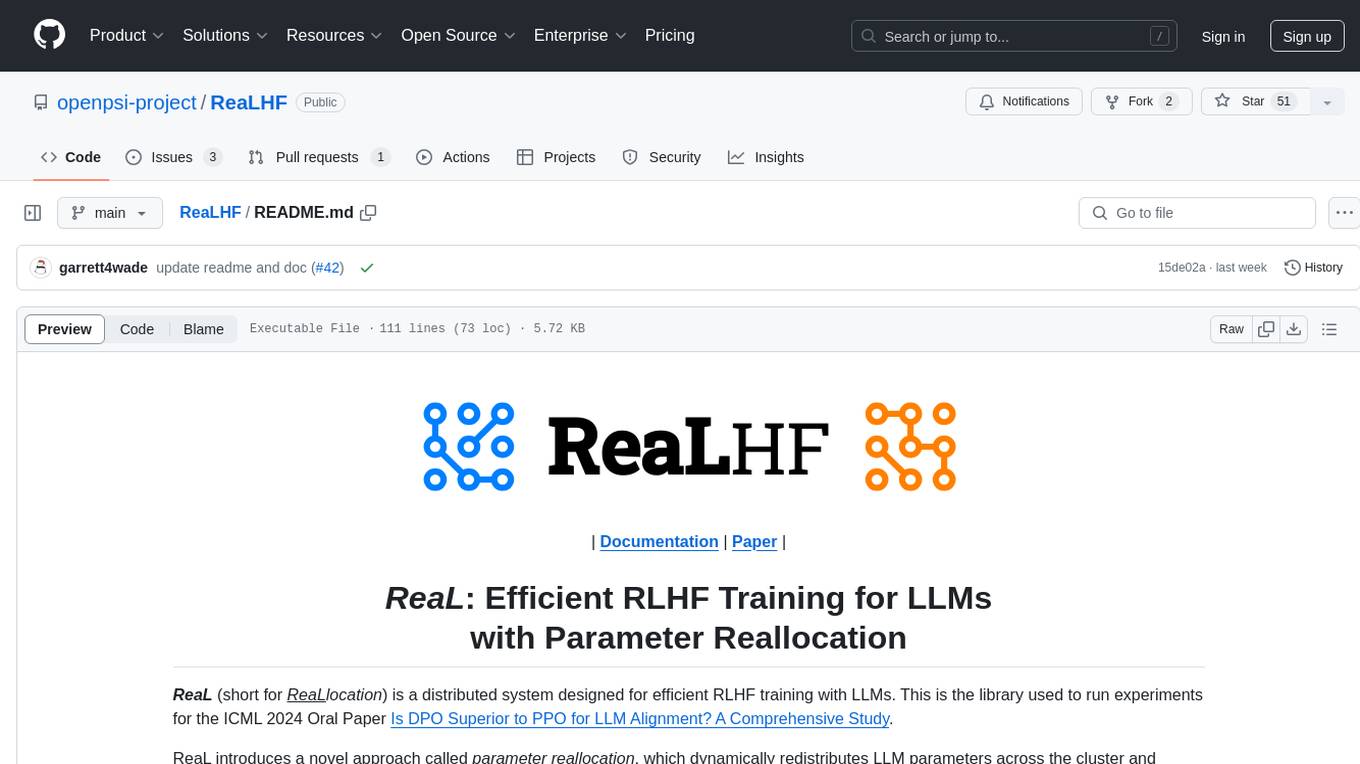
ReaLHF
ReaLHF is a distributed system designed for efficient RLHF training with Large Language Models (LLMs). It introduces a novel approach called parameter reallocation to dynamically redistribute LLM parameters across the cluster, optimizing allocations and parallelism for each computation workload. ReaL minimizes redundant communication while maximizing GPU utilization, achieving significantly higher Proximal Policy Optimization (PPO) training throughput compared to other systems. It supports large-scale training with various parallelism strategies and enables memory-efficient training with parameter and optimizer offloading. The system seamlessly integrates with HuggingFace checkpoints and inference frameworks, allowing for easy launching of local or distributed experiments. ReaLHF offers flexibility through versatile configuration customization and supports various RLHF algorithms, including DPO, PPO, RAFT, and more, while allowing the addition of custom algorithms for high efficiency.
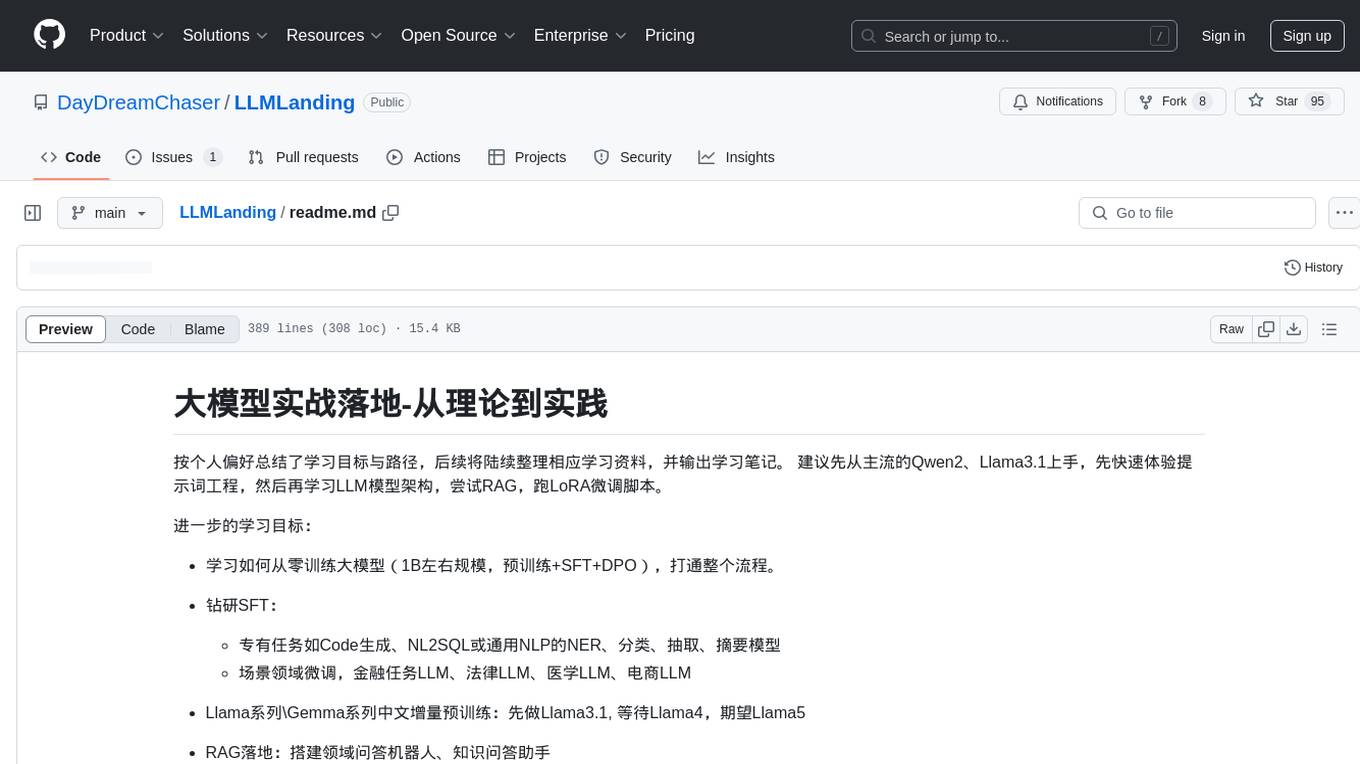
LLMLanding
LLMLanding is a repository focused on practical implementation of large models, covering topics from theory to practice. It provides a structured learning path for training large models, including specific tasks like training 1B-scale models, exploring SFT, and working on specialized tasks such as code generation, NLP tasks, and domain-specific fine-tuning. The repository emphasizes a dual learning approach: quickly applying existing tools for immediate output benefits and delving into foundational concepts for long-term understanding. It offers detailed resources and pathways for in-depth learning based on individual preferences and goals, combining theory with practical application to avoid overwhelm and ensure sustained learning progress.
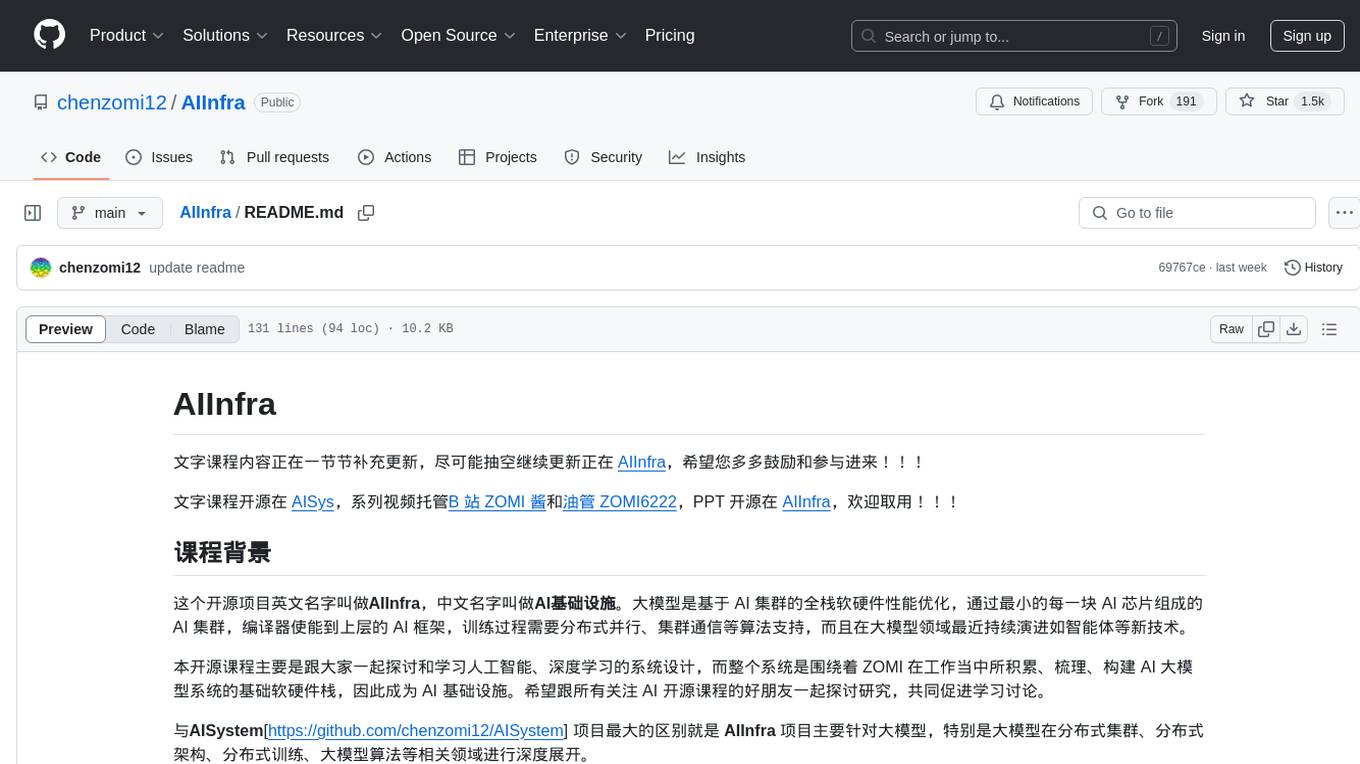
AIInfra
AIInfra is an open-source project focused on AI infrastructure, specifically targeting large models in distributed clusters, distributed architecture, distributed training, and algorithms related to large models. The project aims to explore and study system design in artificial intelligence and deep learning, with a focus on the hardware and software stack for building AI large model systems. It provides a comprehensive curriculum covering topics such as AI chip principles, communication and storage, AI clusters, large model training, and inference, as well as algorithms for large models. The course is designed for undergraduate and graduate students, as well as professionals working with AI large model systems, to gain a deep understanding of AI computer system architecture and design.
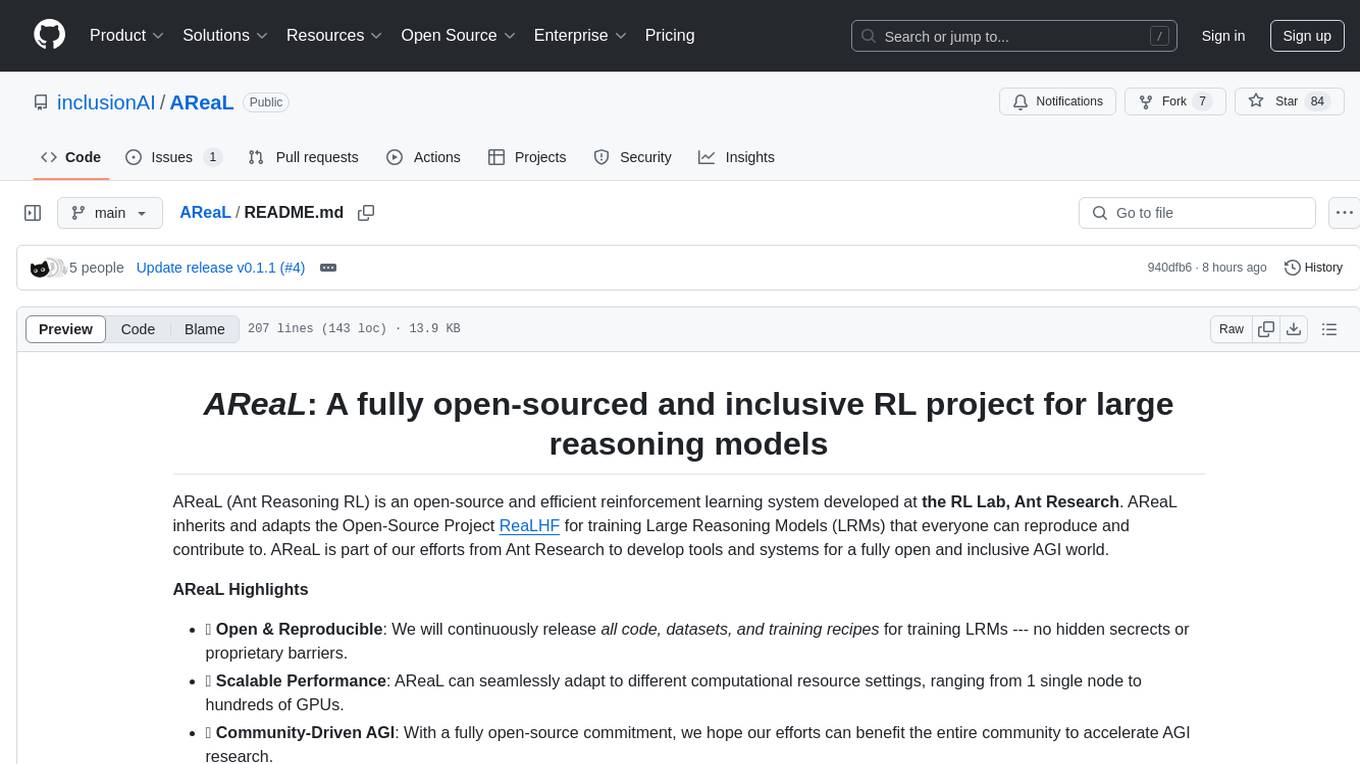
AReaL
AReaL (Ant Reasoning RL) is an open-source reinforcement learning system developed at the RL Lab, Ant Research. It is designed for training Large Reasoning Models (LRMs) in a fully open and inclusive manner. AReaL provides reproducible experiments for 1.5B and 7B LRMs, showcasing its scalability and performance across diverse computational budgets. The system follows an iterative training process to enhance model performance, with a focus on mathematical reasoning tasks. AReaL is equipped to adapt to different computational resource settings, enabling users to easily configure and launch training trials. Future plans include support for advanced models, optimizations for distributed training, and exploring research topics to enhance LRMs' reasoning capabilities.
20 - OpenAI Gpts

How to Train a Chessie
Comprehensive training and wellness guide for Chesapeake Bay Retrievers.
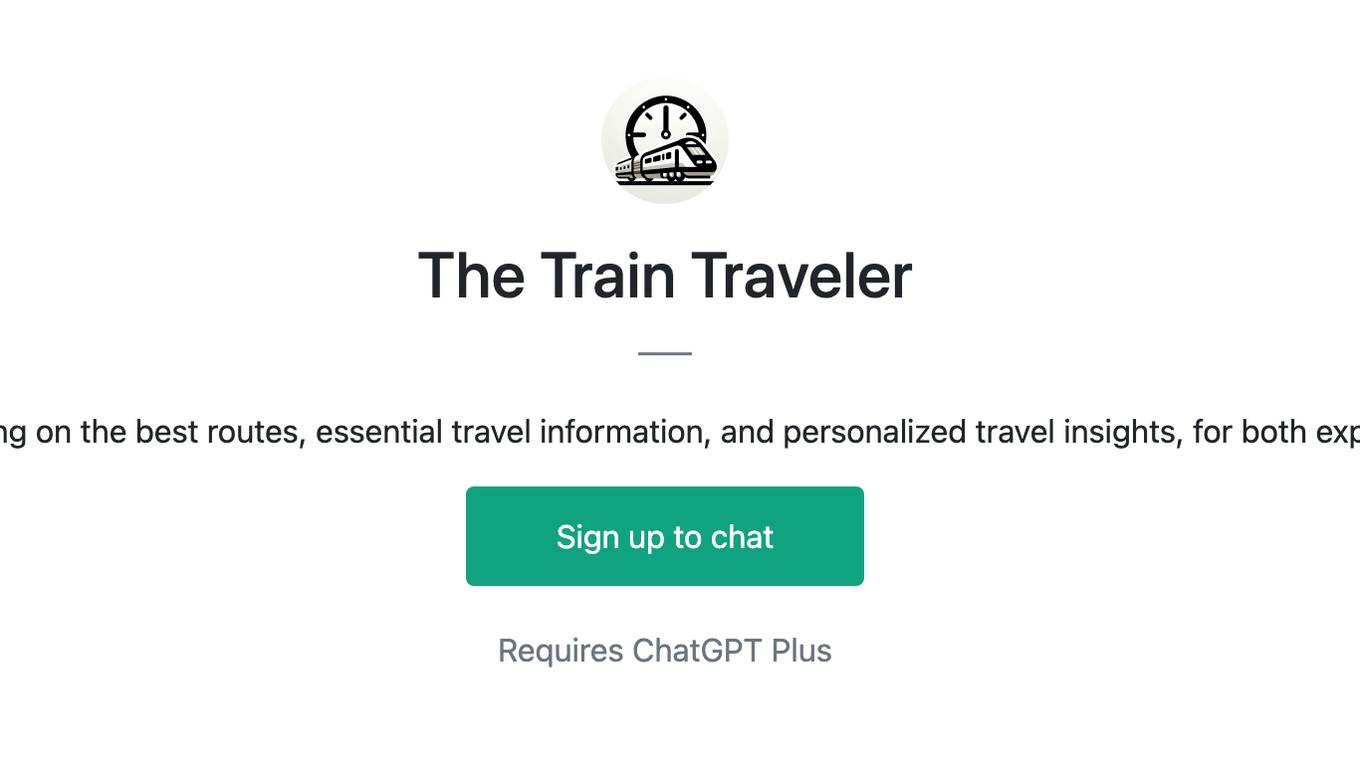
The Train Traveler
Friendly train travel guide focusing on the best routes, essential travel information, and personalized travel insights, for both experienced and novice travelers.

How to Train Your Dog (or Cat, or Dragon, or...)
Expert in pet training advice, friendly and engaging.
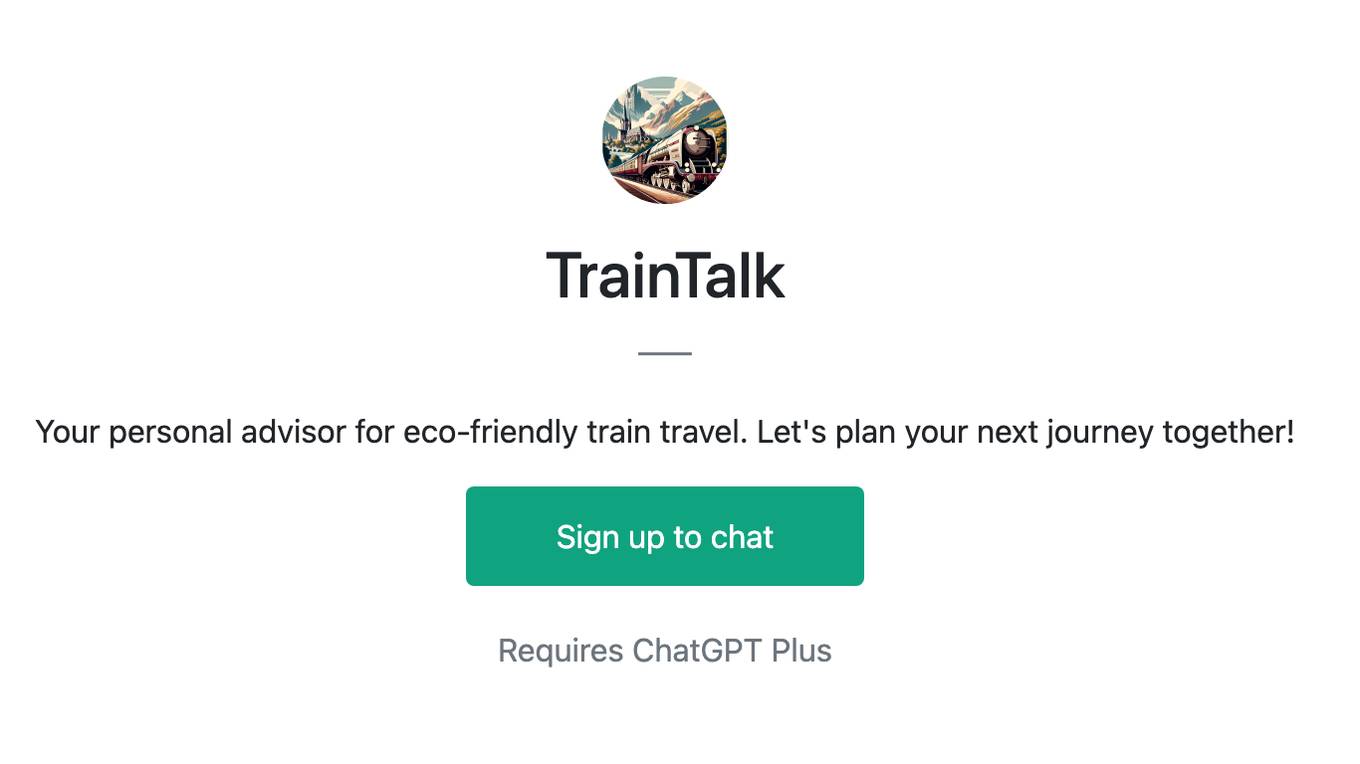
TrainTalk
Your personal advisor for eco-friendly train travel. Let's plan your next journey together!
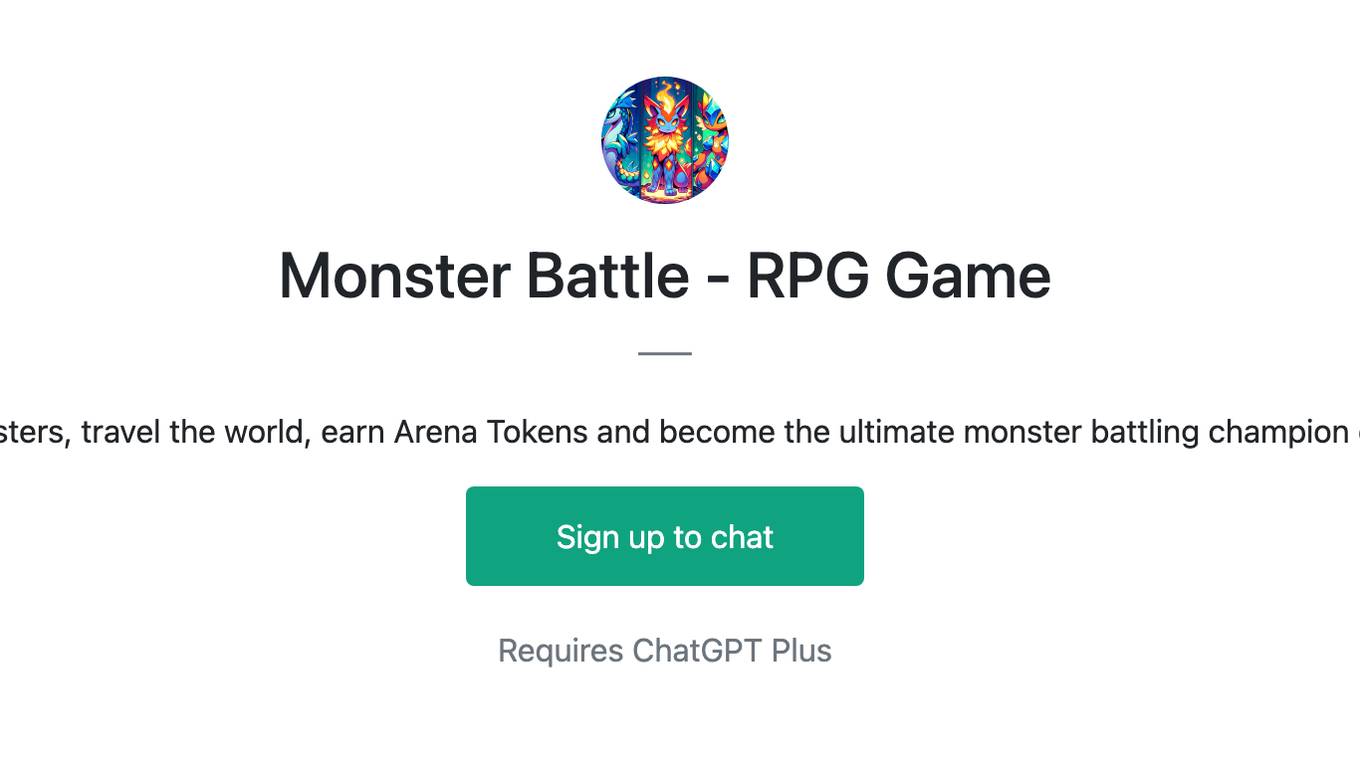
Monster Battle - RPG Game
Train monsters, travel the world, earn Arena Tokens and become the ultimate monster battling champion of earth!
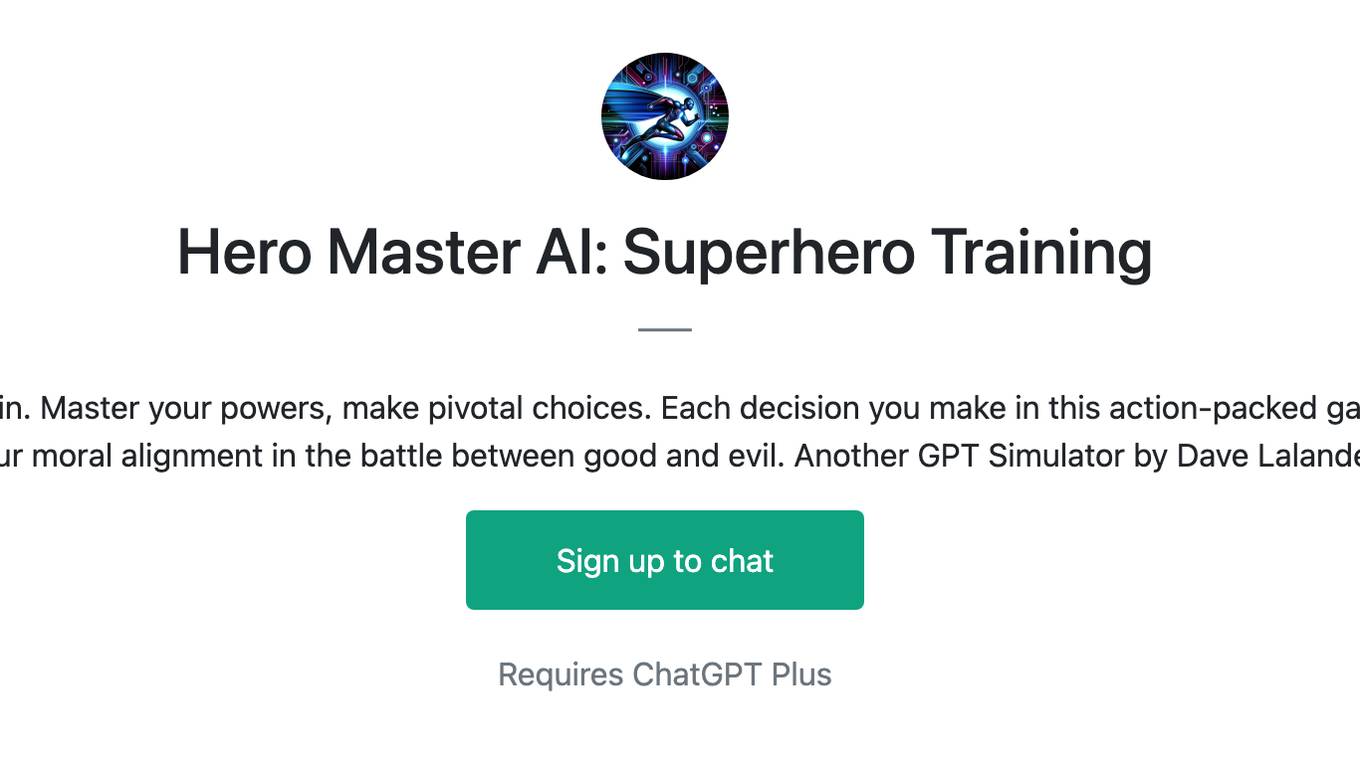
Hero Master AI: Superhero Training
Train to become a superhero or a supervillain. Master your powers, make pivotal choices. Each decision you make in this action-packed game not only shapes your abilities but also your moral alignment in the battle between good and evil. Another GPT Simulator by Dave Lalande

Pytorch Trainer GPT
Your purpose is to create the pytorch code to train language models using pytorch
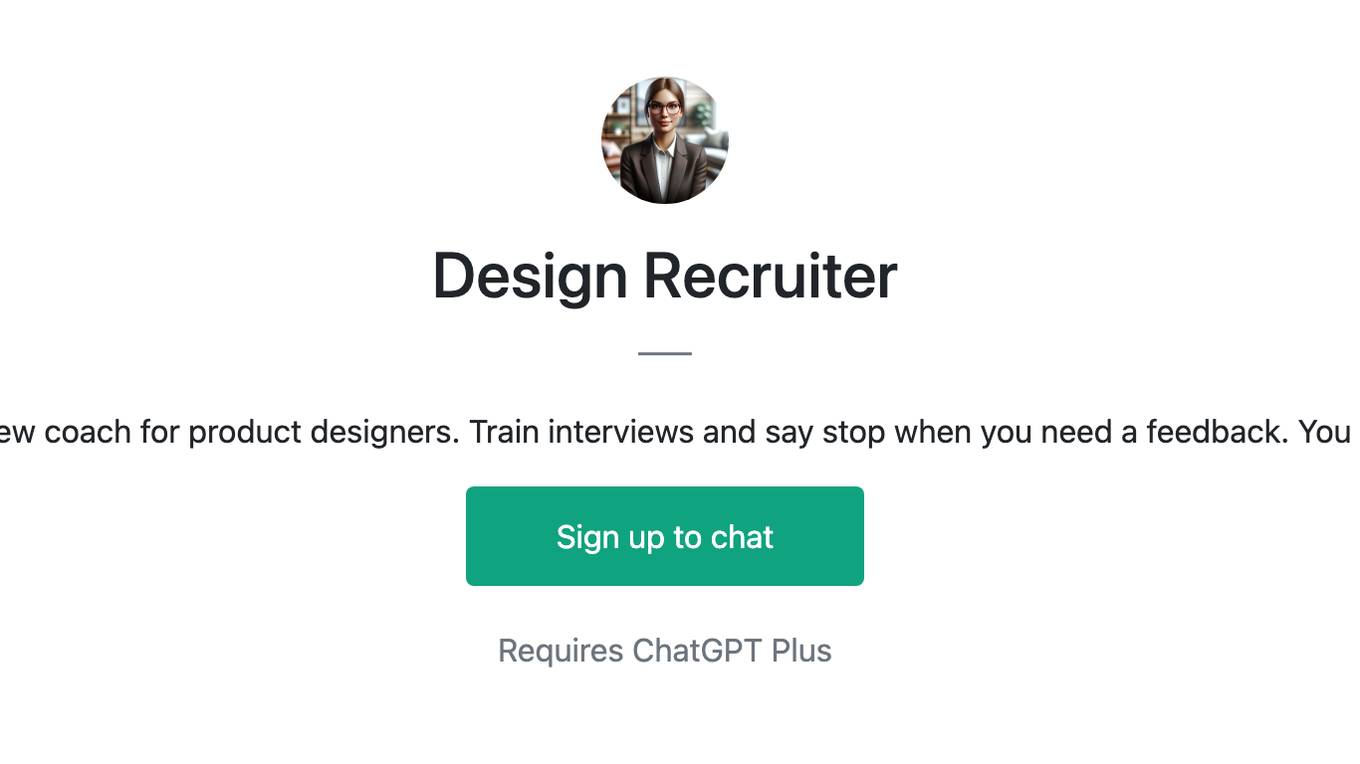
Design Recruiter
Job interview coach for product designers. Train interviews and say stop when you need a feedback. You got this!!

Pocket Training Activity Expert
Expert in engaging, interactive training methods and activities.
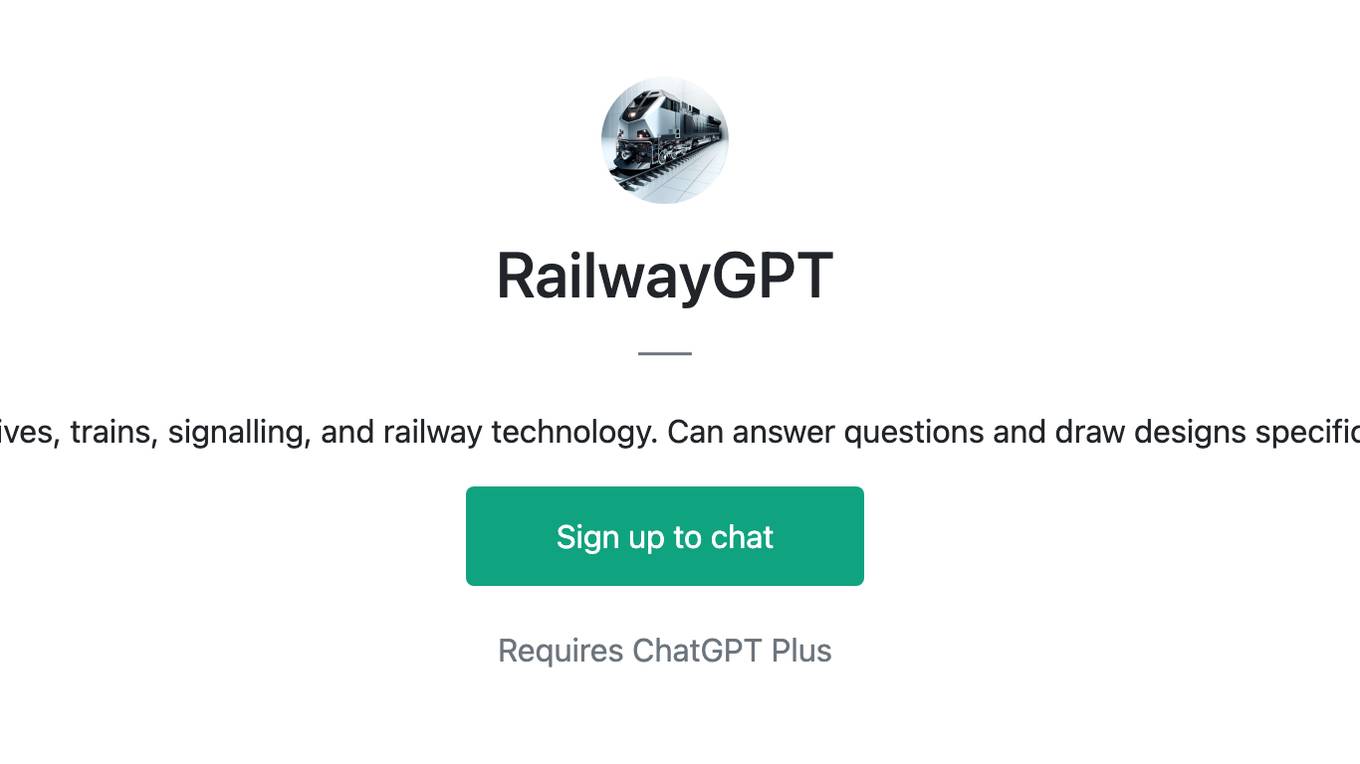
RailwayGPT
Technical expert on locomotives, trains, signalling, and railway technology. Can answer questions and draw designs specific to transportation domain.

Railroad Conductors and Yardmasters Roadmap
Don’t know where to even begin? Let me help create a roadmap towards the career of your dreams! Type "help" for More Information

